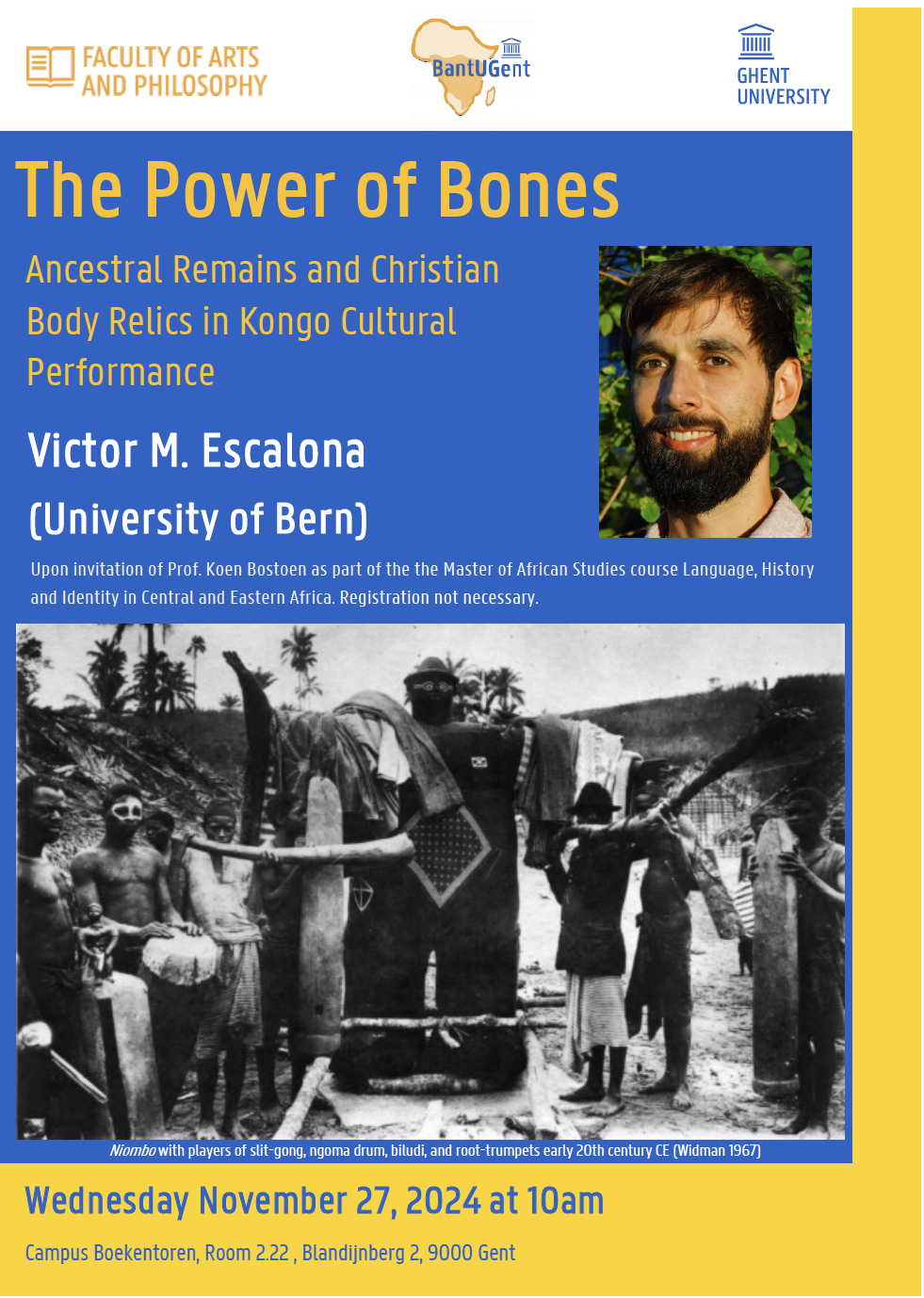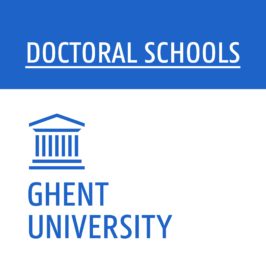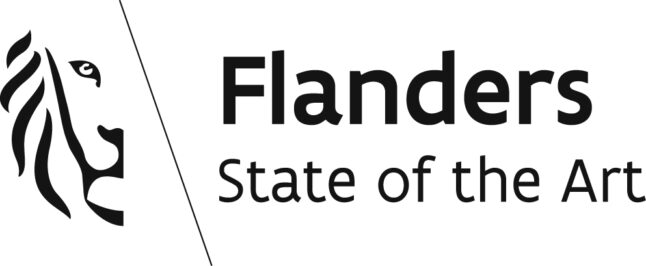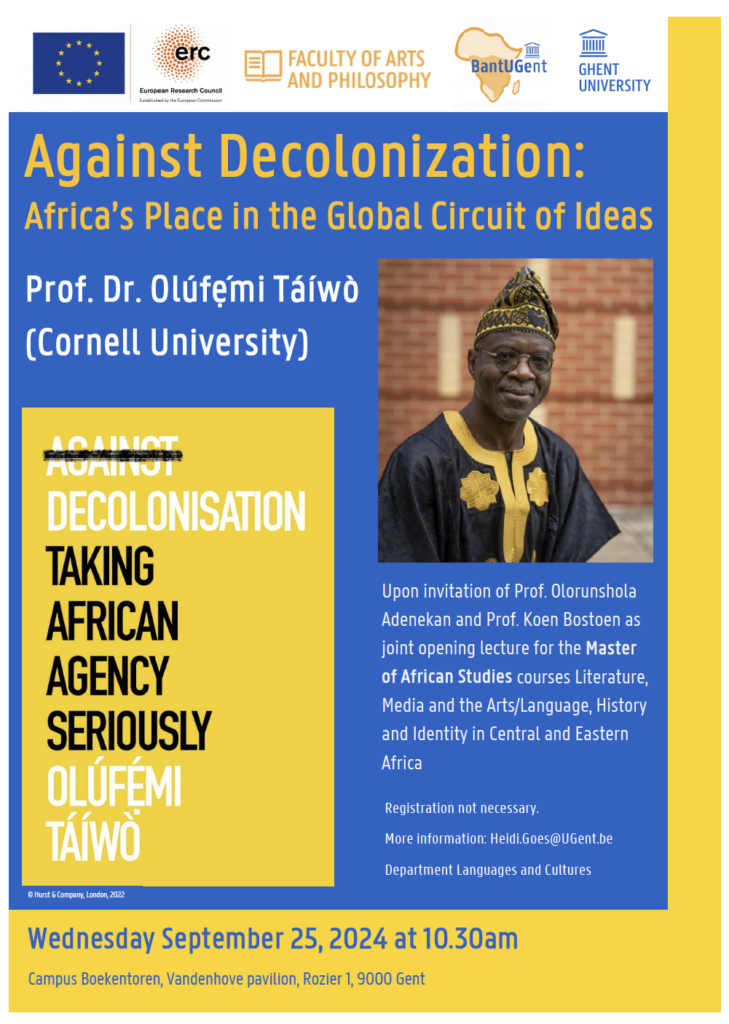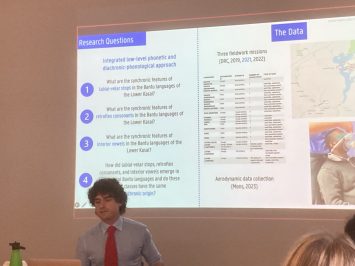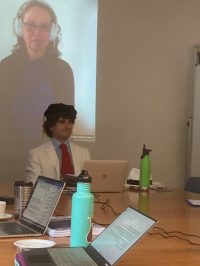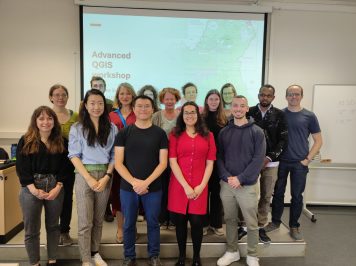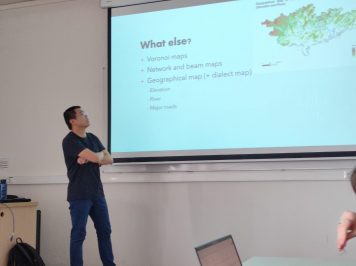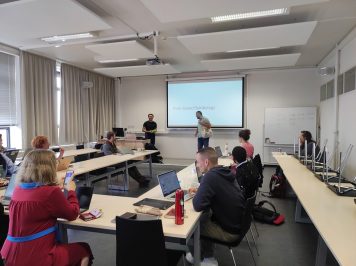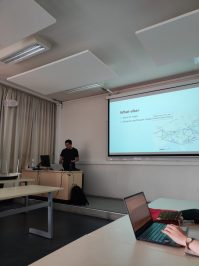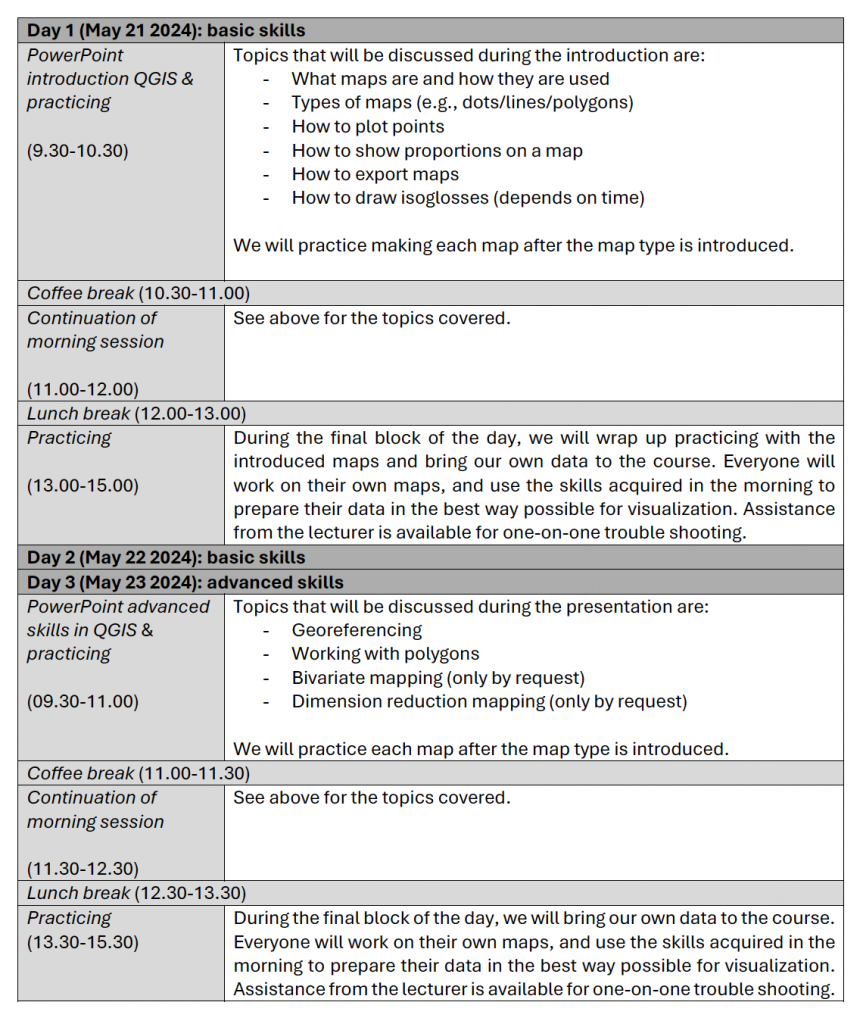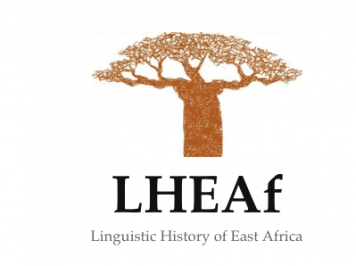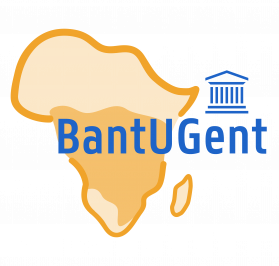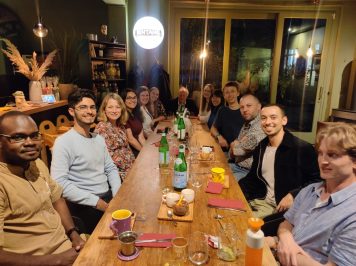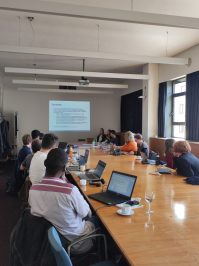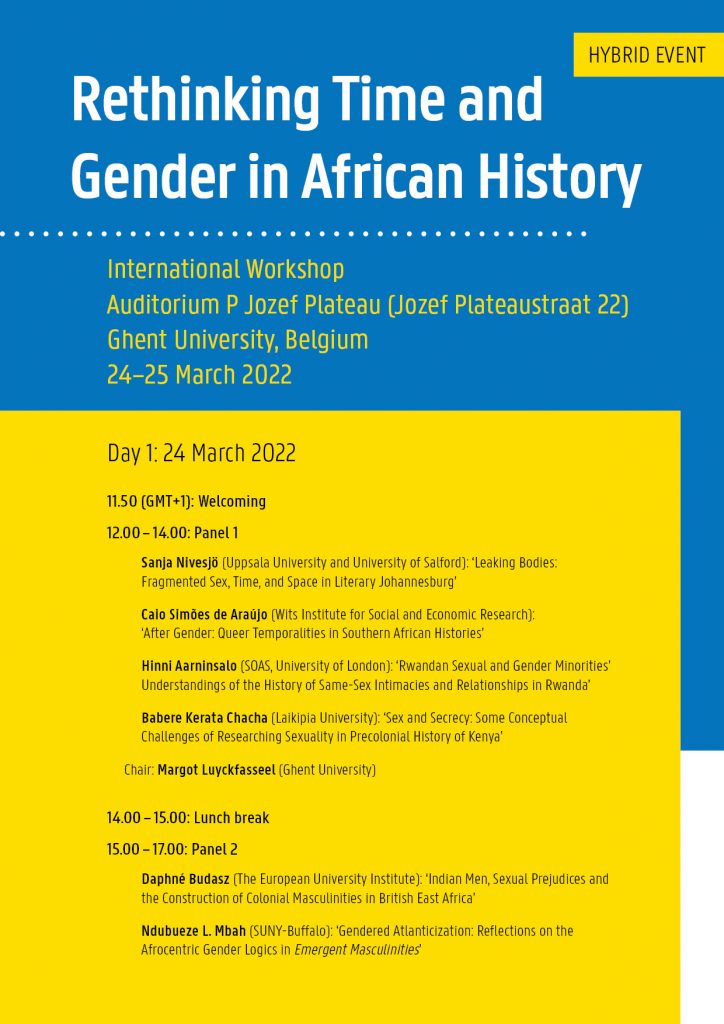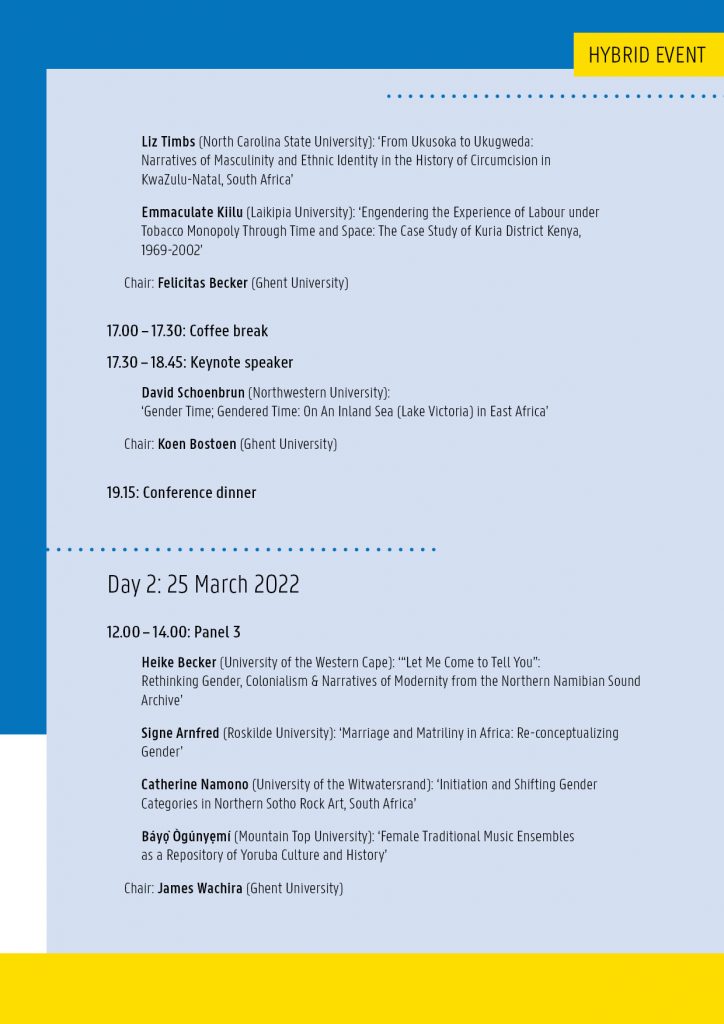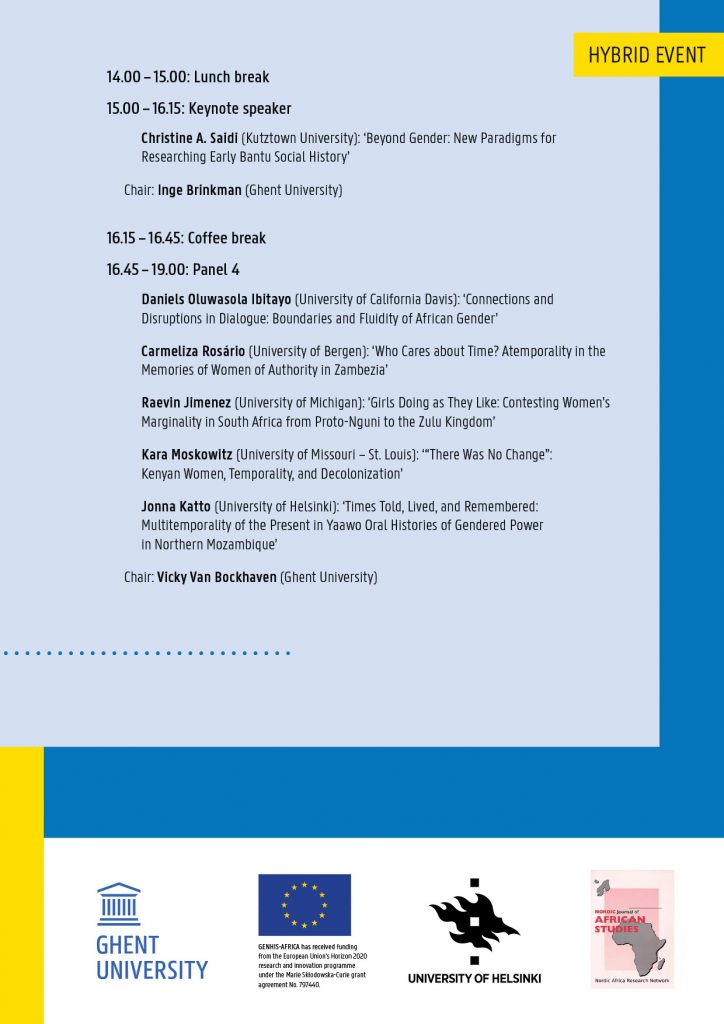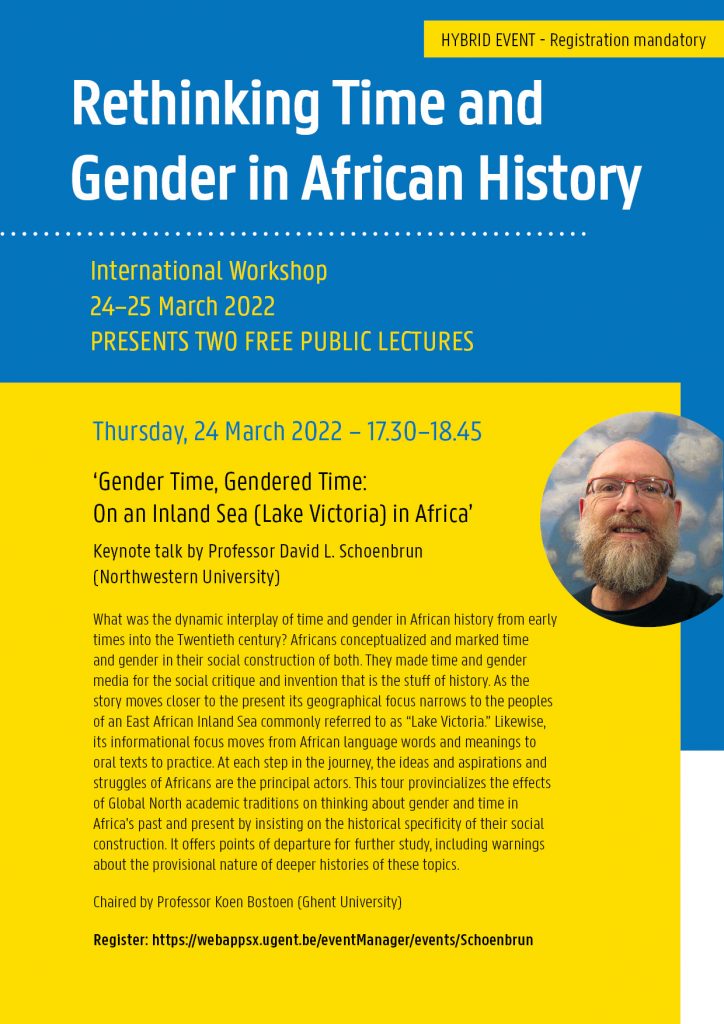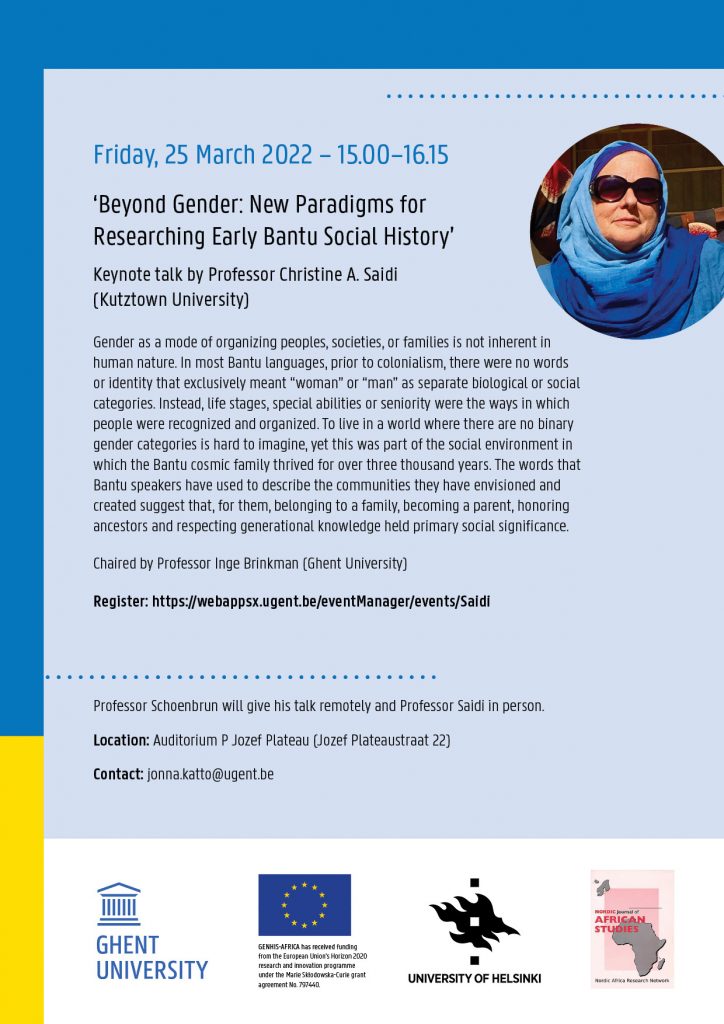-
Mon24Mar20252:30 pmLokaal 2.23 – Panopticon, Blandijn, Campus Boekentoren
BantUGent research seminar with Pieter De Coene: Lexicalizing Spirit Possession (2): Further Remarks and Fieldwork Impressions
Show contentWhat: BantUGent Research Seminar
When: 24 March 2025
Where: Lokaal 2.23 - Panopticon, Blandijn, Campus Boekentoren
Time: 14:00
Presenter: Pieter de Coene
Title: “Lexicalizing Spirit Possession (2): Further Remarks and Fieldwork Impressions”If you wish to attend the seminar online via MS Teams, please reach out to Nina van der Vlugt for the link. -
Mon24Feb20252:00 pmLokaal 2.24 – Blandijn, Campus Boekentoren
BantUGent research seminar: (Ethno)archaeological research in the Central African Republic: Initial Results from the 2025 CongUbangi campaign
Show contentWhat? BantUGent research seminarWhen? 24 February 2025Where? Lokaal 2.24 – Blandijn, Campus BoekentorenTime: 14.00Presenterː Peter CoutrosTitleː “(Ethno)archaeological research in the Central African Republic: Initial Results from the 2025 CongUbangi campaign”To join the meeting online via MS teams, please contact Nina van der Vlugt.
-
Mon20Jan20252:30 pm Lokaal 2.23 - Panopticon, Blandijn, Campus Boekentoren
BantUGent seminar: OV et VO dans les langues bantoues/bantoïdes camerounaises
Show contentWhat? BantUGent research seminar
When? 20 January 2024
Where? Lokaal/Room 2.23 - Panopticon, Blandijn, Campus BoekentorenTime: 14.30-16.00
Who? Lis Kerr on "OV et VO dans les langues bantoues/bantoïdes camerounaises"
To join the meeting online via MS teams, please contact Nina van der Vlugt.
-
Wed27Nov202410:00 amCampus Boekentoren, Room 2.22 , Blandijnberg 2, 9000 Gent
Talk Victor M. Escalona (University of Bern) "The Power of Bones: Ancestral Remains and Christian Body Relics in Kongo Cultural Performance"
-
Mon04Nov20242:00 pm Lokaal 3.30 - Camelot, Blandijn, Campus Boekentoren
BantUGent seminar: introducing Lis Kerr and Arnaud Bizongwako; reporting on the CongUbangi project
Show contentWhat? BantUGent research seminar
When? 4 November 2024
Where? Lokaal 3.30 - Camelot, Blandijn, Campus Boekentoren
Time:
14.00-14.15: introductions by Lis Kerr and Arnaud Bizongwako
14.30-16.00: CongUbangi project
Sara Pacchiarotti - The CongUbangi project: overview and first joint fieldwork mission (April-May 2024)
Peter Coutros - Archaeological results from the 2024 CongUbangi mission
Crisnah Mfouhou - Part 1: A Grammar of Ndunga-le [ndt]: overview and first fieldwork mission (July-August 2024)
Part 2: Preliminaries on Kpala [kpl], an "Ubangi" (Mundu-Baka) language of the Democratic Republic of Congo
Paulin Baraka - First Fieldwork mission in North Ubangi, preliminary results on Mbanza ("Ubangi'', Bandaic) and Furu (Central
Sudanic).To join the meeting online via MS teams, click here.
-
Wed30Oct2024Thu31Oct2024Faculty of Arts and Philosophy
Doctoral School training - Introduction to ELAN and FLEx: audio-visual data processing tools for linguists
Show contentAny researcher that works with audio-visual data will need software to annotate, analyze and process said data, and FLEx and ELAN are powerful tools to do so. This course is an introduction to these two pieces of software, widely used in language documentation. It will offer hands-on training in each software application, and then go further to demonstrate how to use the two of them together.
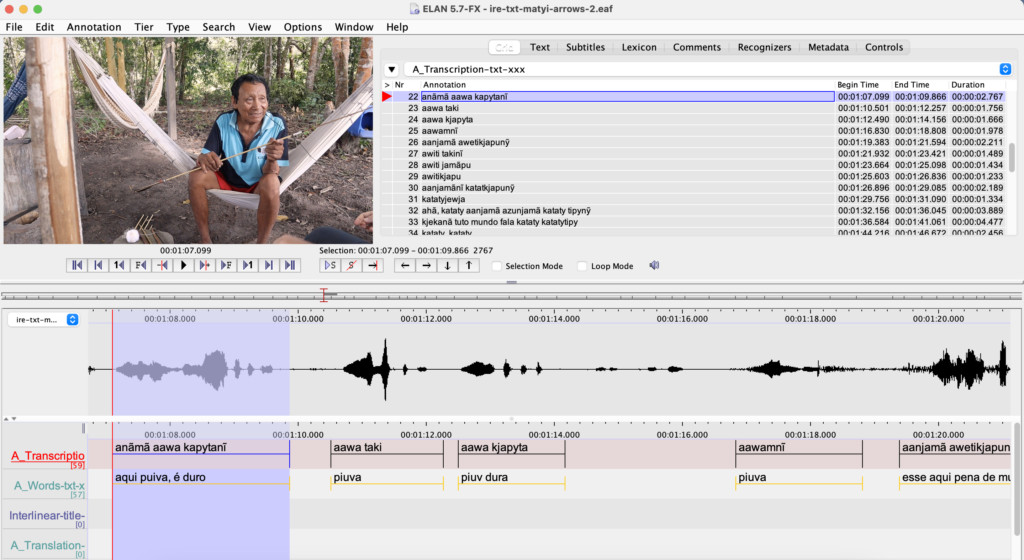 Figure 1: Example of ELAN set-up with a Mỹky speaker (courtesy of Bernat Bardagil)
Figure 1: Example of ELAN set-up with a Mỹky speaker (courtesy of Bernat Bardagil)The course starts with audio segmentation, transcription, and translation in ELAN using EAF templates. Participants learn how to compile their data into a searchable corpus and how to conduct searches across their data. The course will then shift to FLEx, providing participants with basic knowledge of its primary functions and how to build a lexicon, work with texts, and parse and gloss data. Finally, participants will be guided through a step-by- step ELAN-FLEx-ELAN workflow so that they have the ability to benefit from the advantages offered by each program. See below for a preliminary program.
The workshop will take place 30-31 October 2024 at the Faculty of Arts and Philosophy. The first day will be dedicated to ELAN, the second to FLEx and integration between the softwares. No prior experience is required. Registration can be done here until October 16. If you have questions, you can contact Bernat Bardagil (bernat.bardagil@ugent.be) or Nina van der Vlugt (nina.vandervlugt@ugent.be).
 Course lecturer: Prof. Andrew Harvey (University of Bayreuth)
Course lecturer: Prof. Andrew Harvey (University of Bayreuth)As an expert in the field of language description and documentation, professor Harvey has worked extensively with ELAN and FLEx throughout his career, including his ELDP project, also teaching how to use these pieces of software at different international venues, like summer schools.
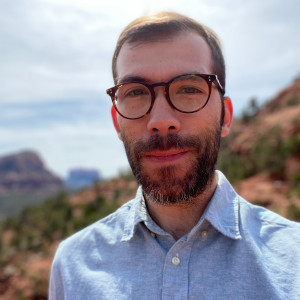
Andrew Harvey (University of Bayreuth) As this event is financed by the Doctoral School of UGent and the Flemish Government, doctoral students are given priority during registration. If PhD students participate in one of the sessions, it counts as a transferable skill course. If PhD students participate in both the sessions, it counts as a specialist course. Evaluation for PhD students are based on attendance and active participation
-
Wed25Sep202410:30 amCampus Boekentoren, Vandenhove pavilion, Rozier 1, 9000 Gent
Prof. Dr. Olúfẹ́mi Táíwò (Cornell University) "Against Decolonization: Africa’s Place in the Global Circuit of Ideas"
Show contentProf. Dr. Olúfẹ́mi Táíwò (Cornell University) will present the talk titled "Against Decolonization: Africa’s Place in the Global Circuit of Ideas" upon invitation of Prof. Olorunshola Adenekan and Prof. Koen Bostoen. It is the joint opening lecture for their Master of African Studies courses "Literature, Media and the Arts in Central and Eastern Africa" and "Language, History and Identity in Central and Eastern Africa".
A recording of the lecture and of the Q&A following the lecture can be found below the poster.
Lecture by Prof. Dr. Olúfẹ́mi Táíwò (Teams recording)
Q&A following the lecture by Prof. Dr. Olúfẹ́mi Táíwò
-
Tue17Sep20243:00 pmCamelot, Blandijn, Campus Boekentoren
BantUGent research seminar with talks by Ernest Nshemezimana and Sofia Mateus
Show contentWhat? BantUGent research seminar
When? September 17, 2024
Where? Room 3.30 - Camelot, Blandijn, Campus Boekentoren
15:00-16:00: Ernest Nshemezimana - "The Expression of Mirativity in Kirundi (DJ62)"
16:00-17:00: Sofia Mateus - "Caculo Cabaça, Cuanza Corridor, Angola: a new archaeological landscape for the study of Central African Iron Age"
To join the meeting online by MS Teams, click here. -
Fri21Jun202410:00 amFaculty Room (1st floor, Blandijn)
Public PhD defense Lorenzo Maselli
Show contentOn Friday June 21 at 10am CET, Lorenzo Maselli will publically defended the joint PhD dissertation titled "Documenting the sounds of the West-Coastal Bantu languages of the Lower Kasai region (DR Congo): An integrated phonetic and diachronic-phonological approach" written under the co-supervision of Prof. Dr. Koen Bostoen (BantUGent), Prof. Dr. Sara Pacchiarotti (BantUGent), and Prof. Dr. Véronique Delvaux (UMons). The defense took place in the Faculty Room on the first floor of the Blandijn building (Blandijnberg 2, 9000 Gent) and could also be followed via livestreaming through MS Teams. The jury was presided by Prof. Jo Van Steenbergen and further included Prof. Nancy Kula (ULeiden), Prof. Rachid Ridouane (Université Sorbonne Nouvelle - CNRS, Laboratoire de Phonétique et Phonologie), Dr. Abbie Hangtan-Sonko (CNRS, LLACAN), Prof. Kathy Huet (UMons), Prof. Claudia Crocco (UGent) and Prof. Shola Adenekan (UGent).
-
Tue21May2024Thu23May20249:30 am6th floor Blandijn
Map making for linguists in QGIS - Doctoral Schools Training BantUGent
Show contentMaps are an important visualization tool for linguists. However, most linguists are not trained in and thus not able to design professional maps. QGIS is opensource mapping software that enables its users to plot features, create data points, or redraw existing maps. For researchers that work with little known languages, software like QGIS is vital in providing reliable maps when there are often none available.
To this end, Matthew Sung (affiliated with the Leiden University Centre of Linguistics and the Leiden University Centre for Digital Humanities) taught several QGIS workshops at the Faculty of Arts and Philosophy from 21 May - 23 May 2024. Participants will also apply the software to their own data. The introduction session was run twice on 21 May and 22 May. Each session could have up to 20 participants. The advanced session was run once on 23 May and had availability for 15 people. Registration closed on 15 April 2024.
As this event was financed by the Doctoral School of UGent and the Flemish Government, doctoral students were given priority during registration. If PhD students participated in the introduction session, it counted as a transferable skill course. If PhD students participated in both the introduction and advanced session, it counted as a specialist course. Evaluation for PhD students were based on attendance and active participation.
The organizer was Nina van der Vlugt (nina.vandervlugt@ugent.be). See below for the program.
-
Fri17May202409:00 - 17:00Faculty Room (Blandijn) + Room 3.1, Tweekerken, Campus Tweekerken
ULeiden-BantUGent workshop: Unravelling Africa’s Early Linguistic History
Show contentOn Friday 17 May, the LHEAf research team from Leiden University will visit Ghent for a joint workshop with BantUGent on the fascinating world of Africa’s early linguistic history. On the program: exploring language contact, diagnosing substrate, and placing linguistic findings in an interdisciplinary context. Be welcome to join the workshop.
Contact: nina.vandervlugt@ugent.be
9am-12pm: Faculty Council Room, Blandijn
Introductions
- 9.15-9.45am
- Introductions BantUGent and LHEAf
- LHEAf project: Unravelling Africa’s Early Linguistic History
Diagnosing Substrate
- 10-10.45am
Substrate Interference in Bantu languages of Central Africa: Insights from Diachronic Phonology — Sara Pacchiarotti - 11am-12pm
Substrate Interference in Eastern Africa — Dominique Loviscach, Alba Hermida Rodriguez, Maarten Mous
12-1.30pm: Lunch break
1.30-5pm: Room 3.1, Tweekerken, Campus Tweekerken
Language contact
- 1.30-2.15pm
(Pre)historic Bantu-Khoisan interactions in Southern Africa in a historical linguistic perspective — Hilde Gunnink
- 2.30-3.15pm
The Bantu Expansion in Eastern Africa — Maarten Mous
Interdisciplinary research
- 3.30-4.15pm
Bantu Language divergence and convergence and deep-time population history in the Lower Kasai area (DR Congo) — Koen Bostoen - 4.15-5pm:
From linguistic to interdisciplinary research in Eastern Africa
- 9.15-9.45am
-
Mon29Apr20243:00 pmRoom 2.23 - Panopticon, Blandijn, Campus Boekentoren
BantUGent research seminar with talks by Megersa Regassa and Brandon Kieffer
Show contentWhat? BantUGent research seminar
When? April 29, 2024
Where? Room 2.23 - Panopticon, Blandijn, Campus Boekentoren
15:00-16:00: Megersa Regassa: "Monsters in Oromo Oral Narratives from a Gendered Perspective”
16:00-17:00: Brandon Kieffer, “Bantu Spirantization in Great Lakes Bantu”
To join the meeting online by MS Teams, click here.
-
Mon25Mar20243:00 pmSimon Stevin, Plateau, Jozef Plateaustraat 22, 9000 Gent
BantUGent seminar with talk by Pieter De Coene (UGent) on lexicalizing spirit possession in Great Lakes Bantu
Show contentWhat? BantUGent research seminar
When? March 25, 2024
Where? vergaderzaal Simon Steven, Jozef Plateaustraat 22, 9000 Gent15.00-16.00: Pieter De Coene: Lexicalizing spirit possession: attestations of -bandw- and related terms in Great Lakes Bantu (part one)
To join the meeting online by MS Teams, click here.
-
Fri08Mar202411:00 amFaculteitsraadzaal, Blandijnberg 2, 9000 Gent
BantUGent seminar with talk by Simon Nsielanga Tukumu (KULeuven) on the Decolonization of Jesuits in Congo
Show contentWhat? BantUGent research seminar
When? March 8, 2024
Where? Faculteitsraadzaal/Facultyroom
11:00-13:00: Simon Nsielanga Tukumu: The Decolonization of the Society of Jesus in the Belgian Congo in the post-World War II: Reasons behind the opening of the Jesuit Novitiate in Djuma
To join the meeting online by MS Teams, click here.
-
Wed31Jan20242:00 pmFaculteitsraadzaal, Blandijnberg 2, 9000 Gent
BantUGent research seminar with talks by Terefe Mitiku Mekonin and Edward Ntonda
Show contentWhat? BantUGent research seminarWhen? January 31, 2024Where? Faculteitsraadzaal/Facultyroom14:00-15:00: Edward Ntonda: "Chikunda in Time and Space : A Historical Sociolinguistic account"
15:00-16:00: Terefe Mitiku Mekonin “Human and animal interaction in Oromo fable”
For the Teams-link, contact: Lorenzo Maselli (lorenzo.maselli@ugent.be)
-
Wed29Nov20232:00 pmFaculteitsraadzaal, Blandijn, Blandijnberg 9, 9000 Gent
BantUGent research seminar: Nina van der Vlugt presents herself and her FWO-funded research project.
Show contentWhat? BantUGent research seminar: Get to know your colleague: Nina van der Vlugt
When? November 29, 2023, 2pm-4pm CETWhere? Faculteitsraadzaal, Blandijn, Blandijnberg 2, 9000 GentOur new colleague Nina van der Vlugt will present herself and her FWO-funded research project on Shona-languages.More info: Lorenzo.Maselli@UGent.be
-
Wed25Oct20232:00 pmVergaderzaal 2.23 - Panopticon, Blandijn, Campus Boekentoren
BantUGent talk Guy Kouarata (UGent) — C10 Bantu languages spoken by hunter-gatherers in the Sangha department (Congo-Brazzaville)
Show contentWhat? BantUGent research seminarWhen? October 25, 2023, 2pm CETWhere? Vergaderzaal 2.23 - Panopticon, Blandijn, Campus Boekentoren + online (Teams link: Meeting ID: 354 586 660 823, Passcode: ve4DUG)Guy Kouarata on C10 Bantu languages spoken by hunter-gatherers in the Sangha department (Congo-Brazzaville)More info: Lorenzo.Maselli@UGent.be
-
Thu19Oct20232:00 pmEn ligne: MS Teams
Journée de présentation des projets de recherche en RDC en collaboration avec l'UGent Africa Platform & l'ISP Mbuji-Mayi
Show contentEn collaboration avec l'Africa Platform de l'Université de Gand (UGent) et l'Institut Supérieur Pédagogique de Mbuji-Mayi, nous organisons le 19 octobre 2023 une journée de présentation des projets de recherche en RDC. Pour plus d'informations voir ici. Pour vous inscrire, veuillez envoyer un email à Annelies.Verdoolaege@UGent.be ou emmanuel.kambaji@gmail.com.
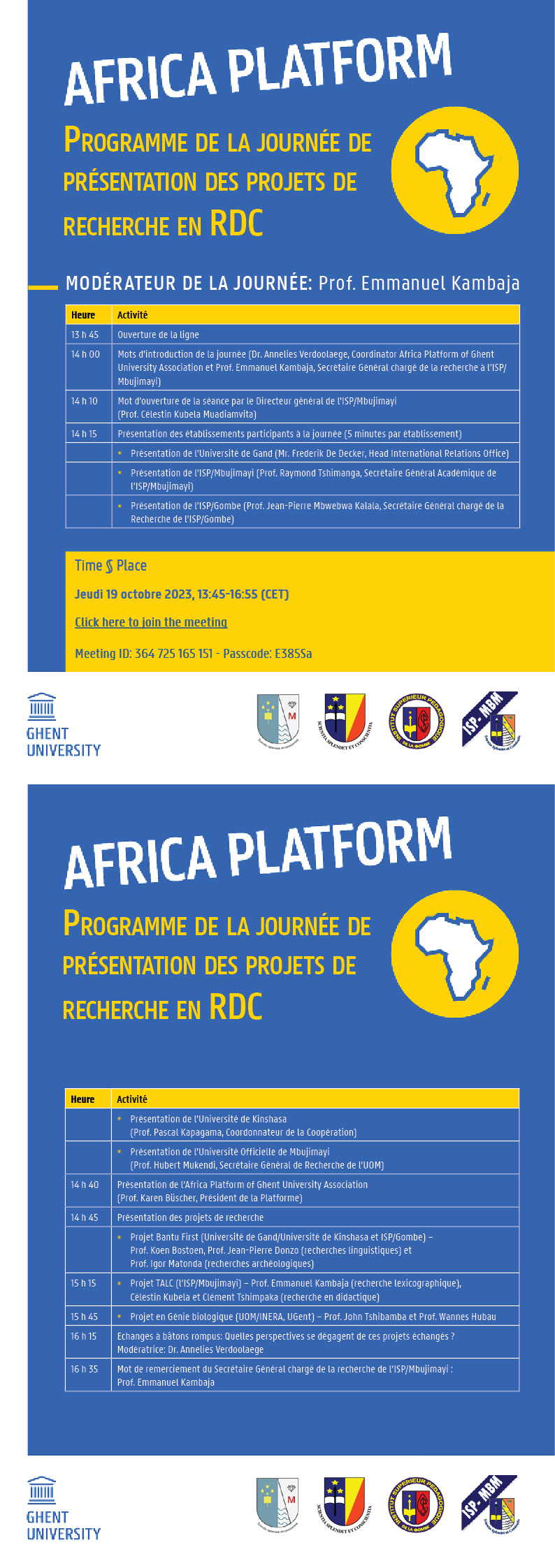
-
Thu29Jun202310:00 amVergaderzaal Panopticon (Room 2.23), Blandijnberg 2, 9000 Ghent
BantUGent seminar with prof. Brinkman, prof. Devos and dr. Kouarata
Show contentWhat? BantUGent research seminar whith three research presentations!
When? June 29, 2023, 10am
Where? Panopticon (third floor, Blandijn) (https://www.ugent.be/lw/nl/diensten/infrastructuur/plannen/blandijn120tweede.pdf)
Who?
Prof. dr. Inge Brinkman: "Rainbows in oral narratives"
Dr. Guy Kouarata, "The simplification of seminasals *mb, *nd and *ng in Bantu zone A, B, C and H languages in Congo-Brazzaville and DRC"
Prof. dr. Maud Devos, "Coconuts in Bantu languages: a linguistic contribution to the story of Cocos Nucifera L. in (East) Africa"
A Teams link for those who wish to attend online is also available here. -
Thu22Jun202310:30 amFaculty Room, Blandijnberg 2, 9000 Gent + online via Zoom
BantUGent-ECC book presentation Jeroen Dewulf (UC Berkeley) "Afro-Atlantic Catholics - America’s First Black Christians"
Show contentOn Thursday June 22, 2023, the UGent Centre for Bantu Studies and the Economies, Comparisons, Connections research group co-organize a talk by Prof. Dr. Jeroen Dewulf (University of California at Berkeley) on his latest publication Afro-Atlantic Catholics - America’s First Black Christians.
Venue: Faculty Room, Blandijnberg 2, 9000 Gent + online via Zoom
Time: 10:30am CET
More info: Heidi.Goes@UGent.be
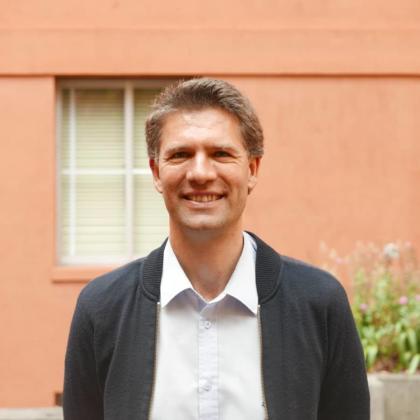
The latest publication by prof. dr. Dewulf examines the influence of African Catholics on the historical development of Black Christianity in America during the seventeenth century.
Black Christianity in America has long been studied as a blend of indigenous African and Protestant elements. Jeroen Dewulf redirects the conversation by focusing on the enduring legacy of seventeenth-century Afro-Atlantic Catholics in the broader history of African American Christianity. With homelands in parts of Africa with historically strong Portuguese influence, such as the Cape Verde Islands, São Tomé, and Kongo, these Africans embraced variants of early modern Portuguese Catholicism that they would take with them to the Americas as part of the forced migration that was the transatlantic slave trade. Their impact upon the development of Black religious, social, and political activity in North America would be felt from the southern states as far north as what would become New York.
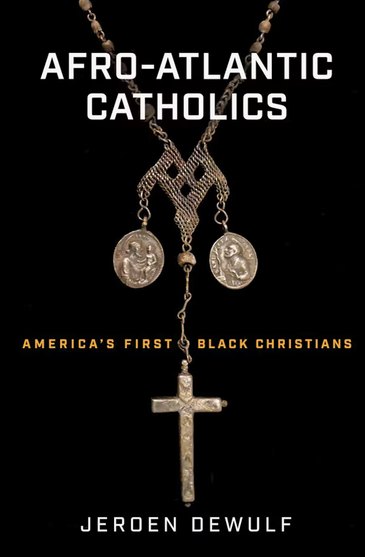
Dewulf’s analysis focuses on the historical documentation of Afro-Atlantic Catholic rituals, devotions, and social structures. Of particular importance are brotherhood practices, which were critical in the dissemination of Afro-Atlantic Catholic culture among Black communities, a culture that was pre-Tridentine in nature and wary of external influences. These fraternal Black mutual-aid and burial society structures were critically important to the development and resilience of Black Christianity in America through periods of changing social conditions. Afro-Atlantic Catholics shows how a sizable minority of enslaved Africans actively transformed the American Christian landscape and would lay a distinctly Afro-Catholic foundation for African American religious traditions today. This book will appeal to scholars in the history of Christianity, African American and African diaspora studies, and Iberian studies.
-
Fri26May202311:00 amFaculty Room, Blandijnberg 2, 9000 Gent + online upon request
BantUGent-ECC talk — Cymone Fourshey (Bucknell University) "Girling African History and Historicizing Girlhoods through Language Data in East and Central Africa"
Show contentOn Friday May 26, 2023, the UGent Centre for Bantu Studies and the Economies, Comparisons, Connections research group co-organize a talk by Prof. Dr. Cymone Fourshey (Bucknell University) on Girling African History and Historicizing Girlhoods through Language Data in East and Central Africa.
Venue: Faculty Room, Blandijnberg 2, 9000 Gent + online upon request
Time: 11am CET
More info: Heidi.Goes@UGent.be
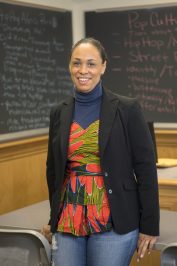
Though they have been drivers of social and historical change and been important sources of knowledge, girls in Africa have rarely been the focus of historical scholarship. African girls and their status as young people tend to be assessed flatly as perpetual and complicit victims (Katshunga 2019: 55). This elision cuts off possibilities and make girls in Africa simultaneously scapegoats for social problems (Oduro et al. 2012), targets of pity and the “salvationist gaze” (George 2014: 113), and dependents on benevolence from elders, government representatives, and development institutions. It is both this gap in the scholarship and the harm created by such views of African girls in the present that shape the historical questions raised in this paper.Through an examination of East and Central African language evidence relevant to generation, girlhood, and family, this paper makes claims about the historical possibilities around girlhood in ancient times as means of reconsidering the social status and meaning of girlhoods in more recent eras. There will be opportunities for discussion of comparative historical linguistics and uncovering and representing girls’ voices in written historical records to better understand their roles in family and across generations. How might language data help to ensure girls' contributions are represented in histories at least as well as male youths' experiences are.
-
Thu25May202310:00 amRoom 3.30 Camelot, Blandijn, Campus Boekentoren + online
BantUGent research seminar with talks in African Archaeology and Linguistics by Igor Matonda, Maud Devos and Sara Pacchiarotti
Show contentWhat? BantUGent research seminarWhen? May 25, 2023Where? Room 3.30 Camelot, Blandijn, Campus Boekentoren + online through MsTeams
10:00-10:30 Igor Matonda (UNIKIN - BantUGent): Mapping the Archaeological Landscape of the Kwilu-Kasai River Network, Democratic Republic of the Congo10:30-11:00 Maud Devos (RMCA - BantUGent) Coconuts in Bantu languages: The story of the Cocos nucifera L. as told through language11:00-11:30 Sara Pacchiarotti (BantUGent): The Congo-Ubangi watershed : An interdisciplinary approach to the genesis of a linguistic accretion zone in Central AfricaContact:
Sifra Van Acker (sifra.vanacker@ugent.be)
Lorenzo Maselli (lorenzo.maselli@ugent.be)
-
Mon15May20232:00 pmRoom 3.30 Camelot (Blandijn)
ΔiaLing talk Hilde Gunnink (BantUGent) “Bantu-Khoisan contact in Southern Africa: reconstructing prehistoric contact situations”
Show contentPre-colonial Southern Africa is characterized by two language groups: Bantu languages, who arrived through southward migrations in the last two thousand years, and Khoisan languages, spoken by some of Southern Africa’s first inhabitants. Contact between these two groups led to the demise of most Khoisan-speaking communities, but also to extensive contact-induced changes in Southern African Bantu languages. In this talk, I give an overview of Bantu-Khoisan contact, which linguistic features Bantu languages adopted from their Khoisan-speaking neighbours, and the social, cultural and economic circumstances under which these different ethnolinguistic populations interacted. Using historical linguistic methods, I show that certain Khoisan-derived features in Bantu languages date back to earlier reconstructed stages of the languages, suggesting a certain time-depth, and giving insight into how Bantu-Khoisan interactions changed throughout time.
-
Thu27Apr202310:00 amVergaderzaal 3.31 (Avalon) - Campus Boekentoren, gebouw 05.03 - Blandijn, Blandijnberg 2, 9000 Ghent
BantUGent seminar with Lorenzo Maselli on LV articulation in Sakata: preliminary notes
Show contentWhat? BantUGent research seminar
When? April 27, 2023, 10am
Where? Avalon (third floor, Blandijn) (https://www.ugent.be/lw/nl/diensten/infrastructuur/plannen/blandijn130140.pdf)
Lorenzo Maselli (UGent) will give a talk on LV articulation in Sakata: preliminary notesWe prefer to welcome you in real life, but if you cannot make it, you can follow online through MS Teams. Ask Sifra Van Acker to get the link.
-
Wed29Mar2023Thu30Mar202312:00:00-18:00:00Simon Stevin Room, Plateau-Rozier, Jozef Plateaustraat 22 (Day 1); Faculty Council Room, Blandijnberg 2 (Day 2)
BantuFirst workshop "An Archaeology of the Bantu Expansion: early settlers south of the Congo rainforest"
Show contentBetween 2018 and 2022 the BantuFirst archaeology team conducted seven field seasons across Kinshasa, Kwilu, Mai-Ndombe, and Kongo-Central provinces. Through a combination of large-scale survey and targeted excavations, the project has identified 176 new sites ranging in age from the Middle Stone Age (~300ka BP) through the colonial period. Excavations at 26 of these locations has produced voluminous new information on the changing material culture, subsistence practices, and settlement patterns of the communities south of the Congo rainforest, as well as the evolving palaeoenvironmental conditions in which they lived. This data also includes c. 100 new carbon-14 dates, extending from 30ka – 400 BP, with which these processes have been radiometrically anchored. This BantuFirst workshop is meant to prepare an edited book volume that will publish, contextualize and valorize this wealth of new and varied datasets. It will develop from these original data new insights on early settlement south of the Congo rainforest over the last three millennia, and challenge settled truths about the Bantu Expansion. In order to expand the scope and perspectives, multiple subject experts unaffiliated with the BantuFirst project have been included as contributors to the workshop and the volume.
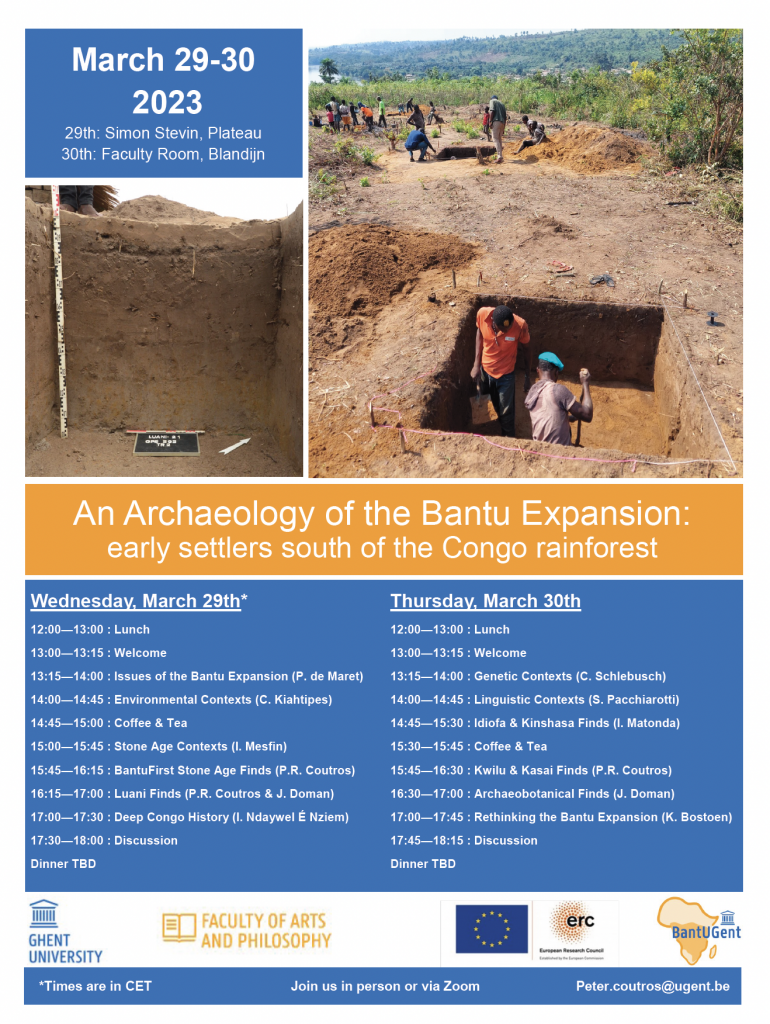
-
Sun05Mar2023Mon06Mar202309.30-16.15at Room 306, ILCAA, Tokyo University of Foreign Studies (Hybrid*)
Closing workshop ILCAA-BantUGent Joint Research Project "'The Past and Present of Bantu Languages: Integrating Micro-Typology, Historical-Comparative Linguistics and Lexicography"
Show contentFor online participation (only for Day 2), please register here.
Day 1 (closed session)
Session 1 (13.30-15.00 JST = GMT+9)
Data session: A Cross-Bantu perspective on causative/inchoative verb alternation
Convenor: Koen Bostoen (BantUGent)
“A historical-comparative exploration of causative/inchoative verb alternations in Bantu”
Discussants: Shigeki Kaji (Kyoto Sangyo University), Maya Abe (Osaka University)
Session 2 (15.30-17.00 JST = GMT+9)
Data session: Subject properties in Bantu
Convenor: Nobuko Yoneda (Osaka University)
Discussants: Guy Kouarata (BantUGent), Yuka Makino (ILCAA/JSPS)
Day 2 (open session)
Session 3 (09.30-11.00 JST = GMT+9)
Makoto Furumoto (ILCAA): "Rethinking the historical relation of Zanzibar Swahili with Comorian"
Minah Nabirye (BantUGent): "Cleft constructions in Lusoga (Bantu, JE16)"
Sara Pacchiarotti (BantUGent) & Heidi Goes (BantUGent): "The reconstruction of Proto-WCB independent and possessive pronouns for speech act participants: does morphological evidence align with lexicon-based phylogenetic groupings?"
Symposium (13.00-16.15 JST = GMT+9)
13.00-13.15: Opening remarks
13.15-14.00: Cross-Bantu typology
Daisuke Shinagawa (ILCAA) "A micro-parametric appraoch to cross-Bantu typology and its insight to the group-internal structural diversification" — Discussant: Sara Pacchiarotti (BantUGent)
14.15-15.00: Historical linguistics
Koen Bostoen (BantUGent) "The Bantu Expansion or how West Africans transformed Africaʼs linguistic, cultural and biological landscapes" — Discussant: Nobuko Yoneda (Osaka University)
15.15-16.00: Lexicography
Gilles-Maurice de Schryver (BantUGent) "Investigating the feasibility of a hub-and-spoke model to hold ILCAA's Bantu lexica into a single multipurpose online dictionary database" — Discussant: Kanji Kato (Research Organization of Information and Systems/TUFS)
16.00-16.15: Closing remarks
This event is organised and financially supported by the JSPS-FWO Bilateral Project "The Past and Present of Bantu Languages: Integrating Micro-Typology, Historical-Comparative Linguistics and Lexicography". It is co-organized by the UGent Centre for Bantu Studies (BantUGent) and ILCAA's core project of linguistics "Description and Documentation of Language Dynamics in Asia and Africa: Toward a More In-depth Understanding of the Languages and Cultures of People Living in Asia and Africa (DDDLing)".
'The Past and Present of Bantu Languages: Integrating Micro-Typology, Historical-Comparative Linguistics and Lexicography' is a bilateral joint research program funded by the Japan Society for the Promotion of Science (JSPS) in association with the Research Foundation – Flanders (FWO).



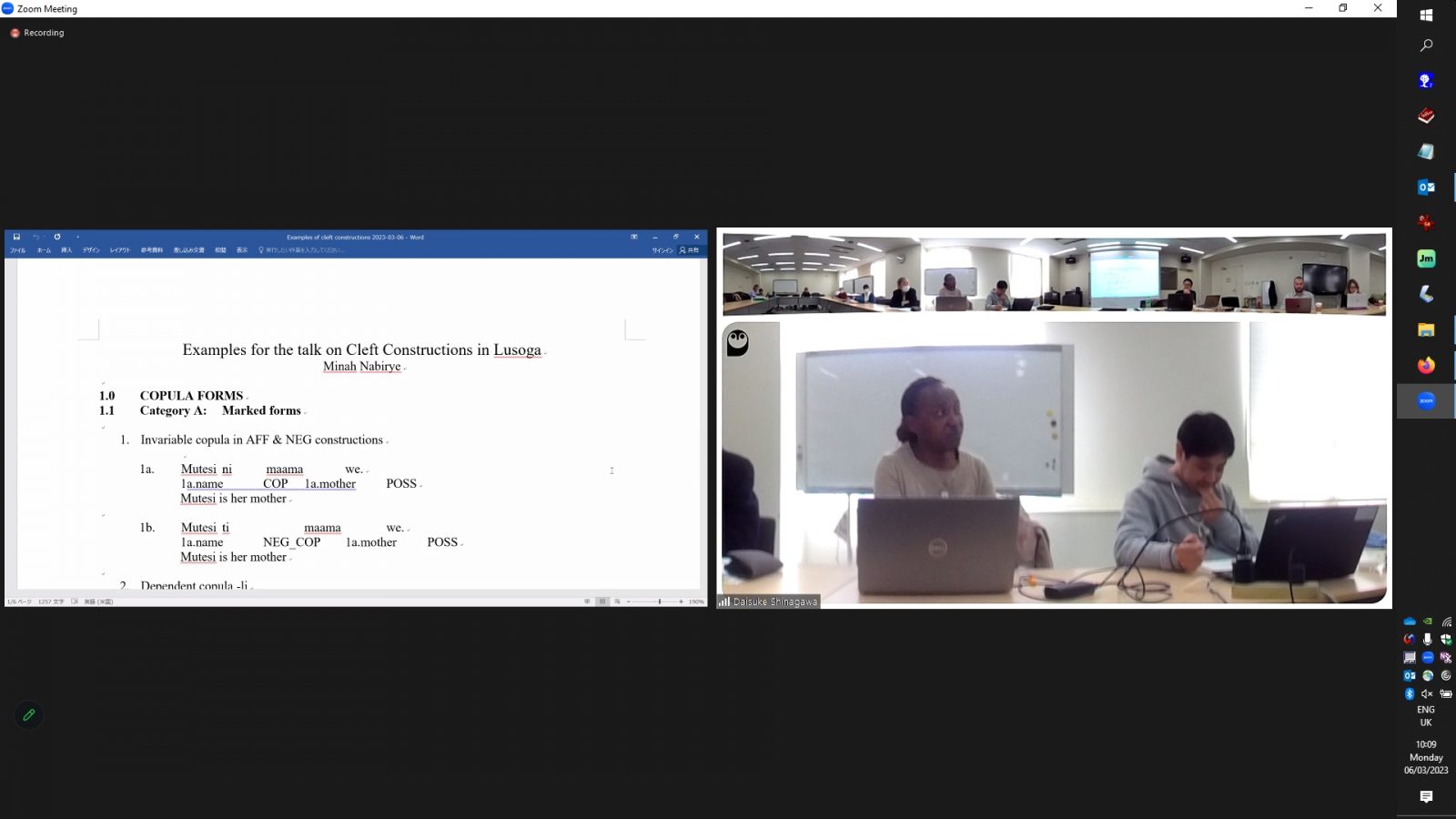




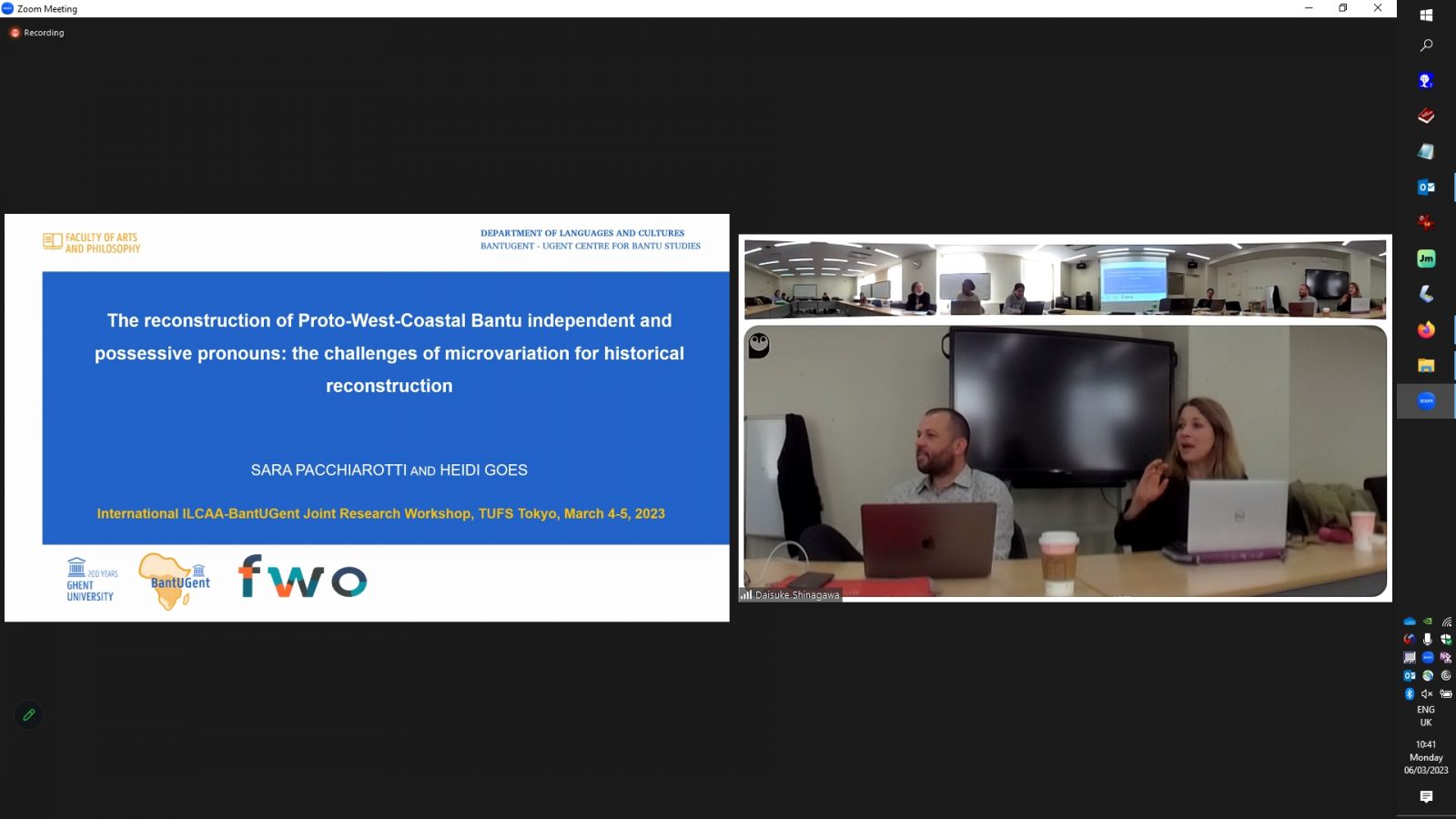

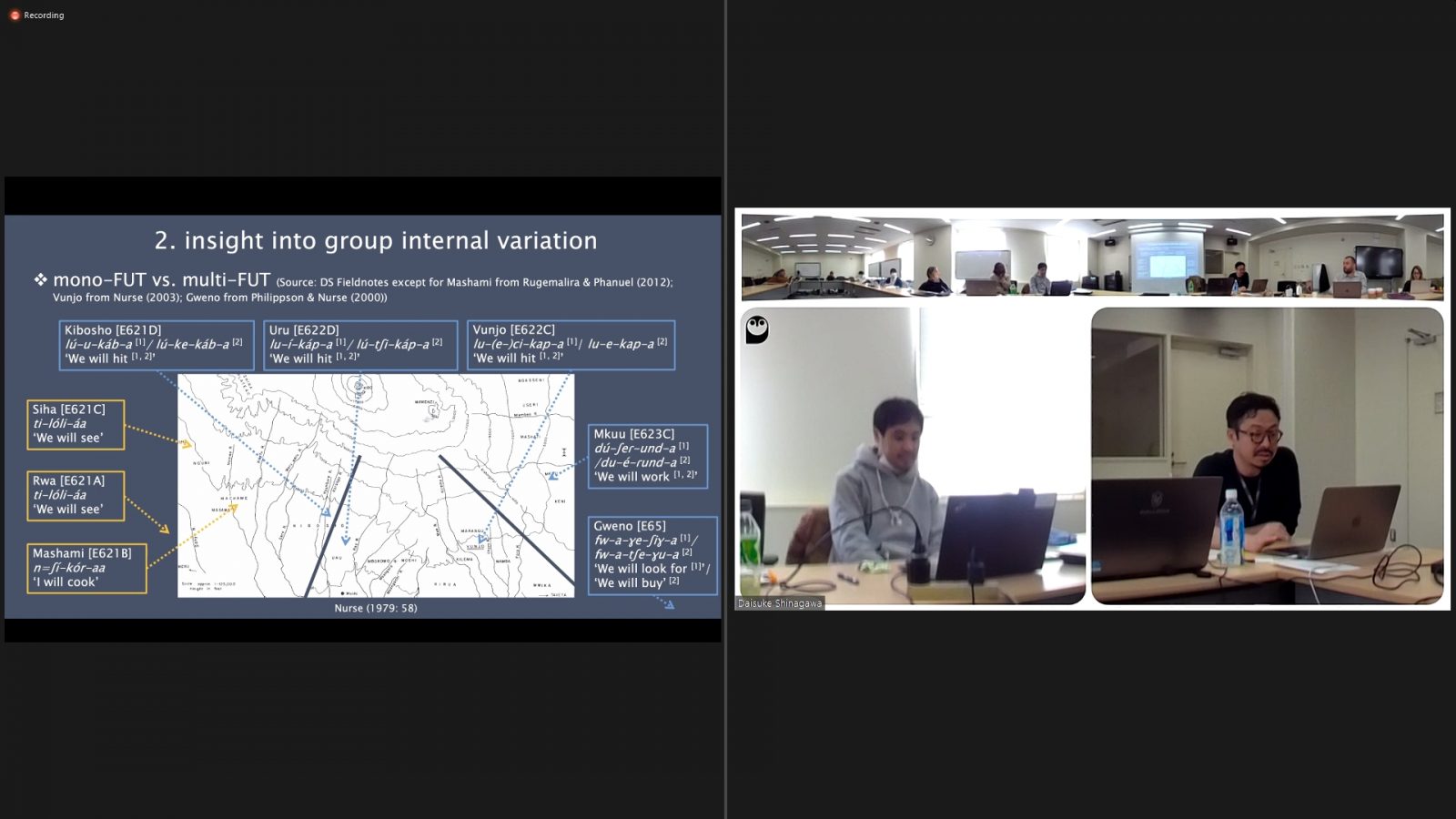

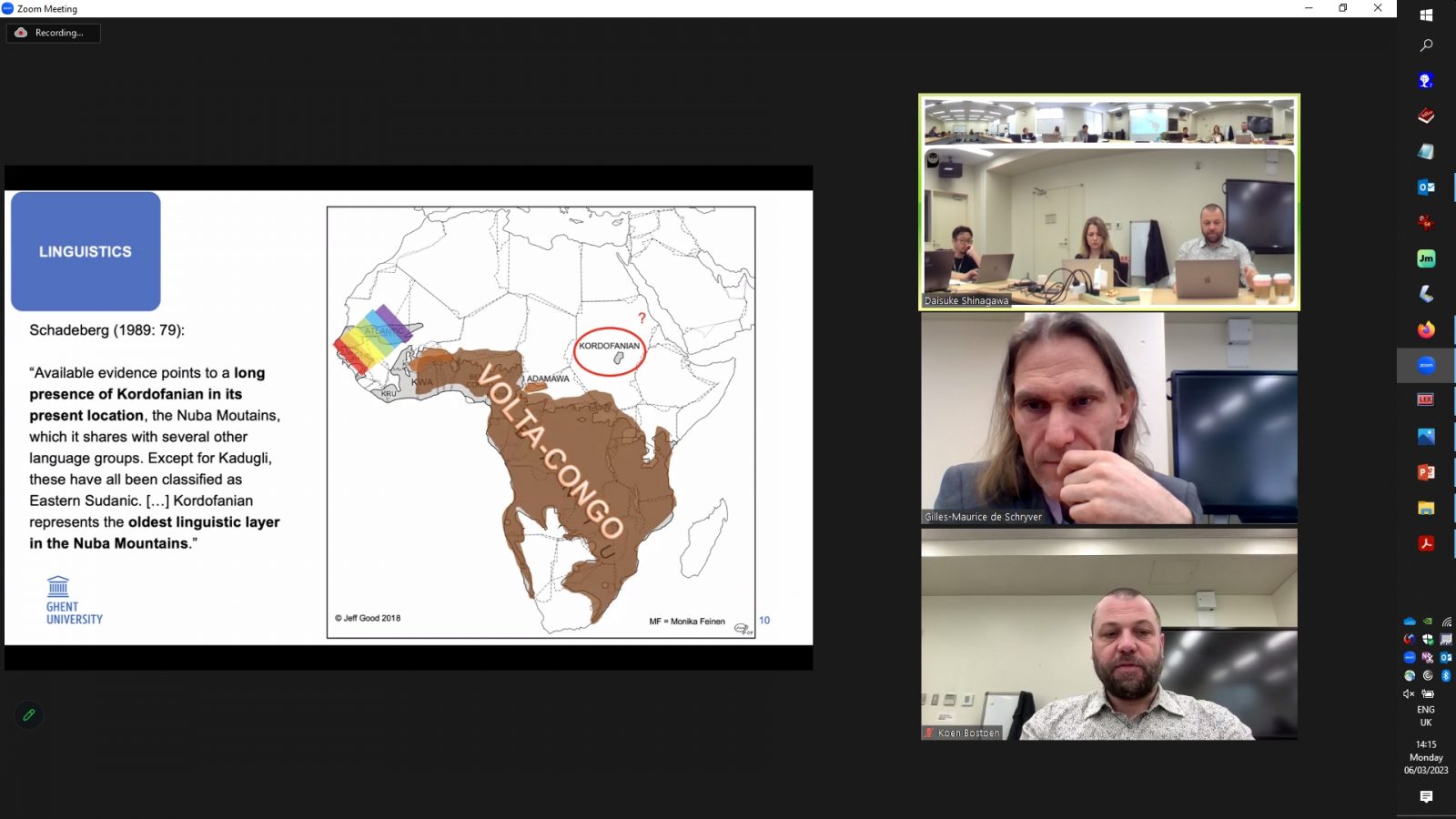

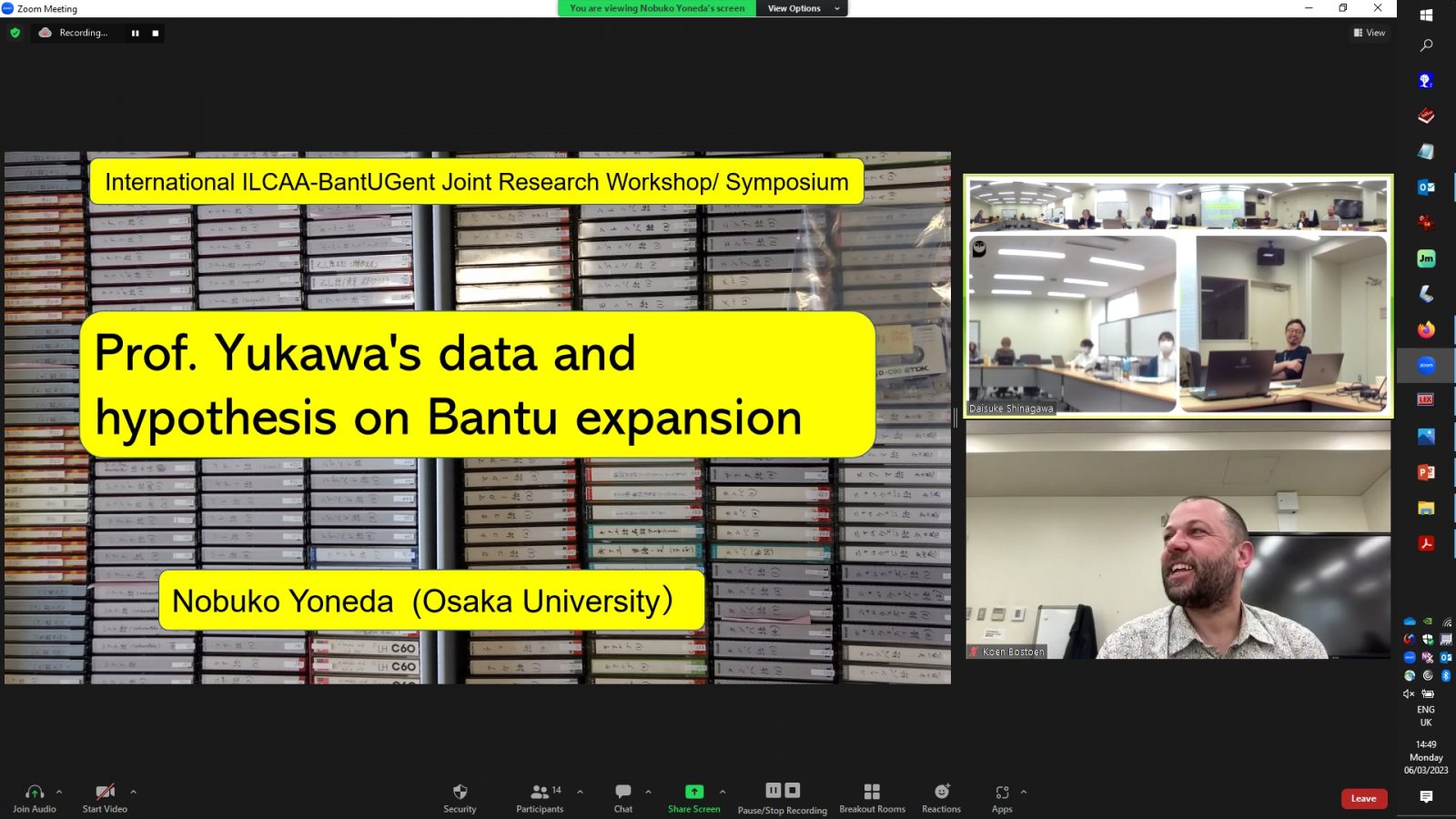

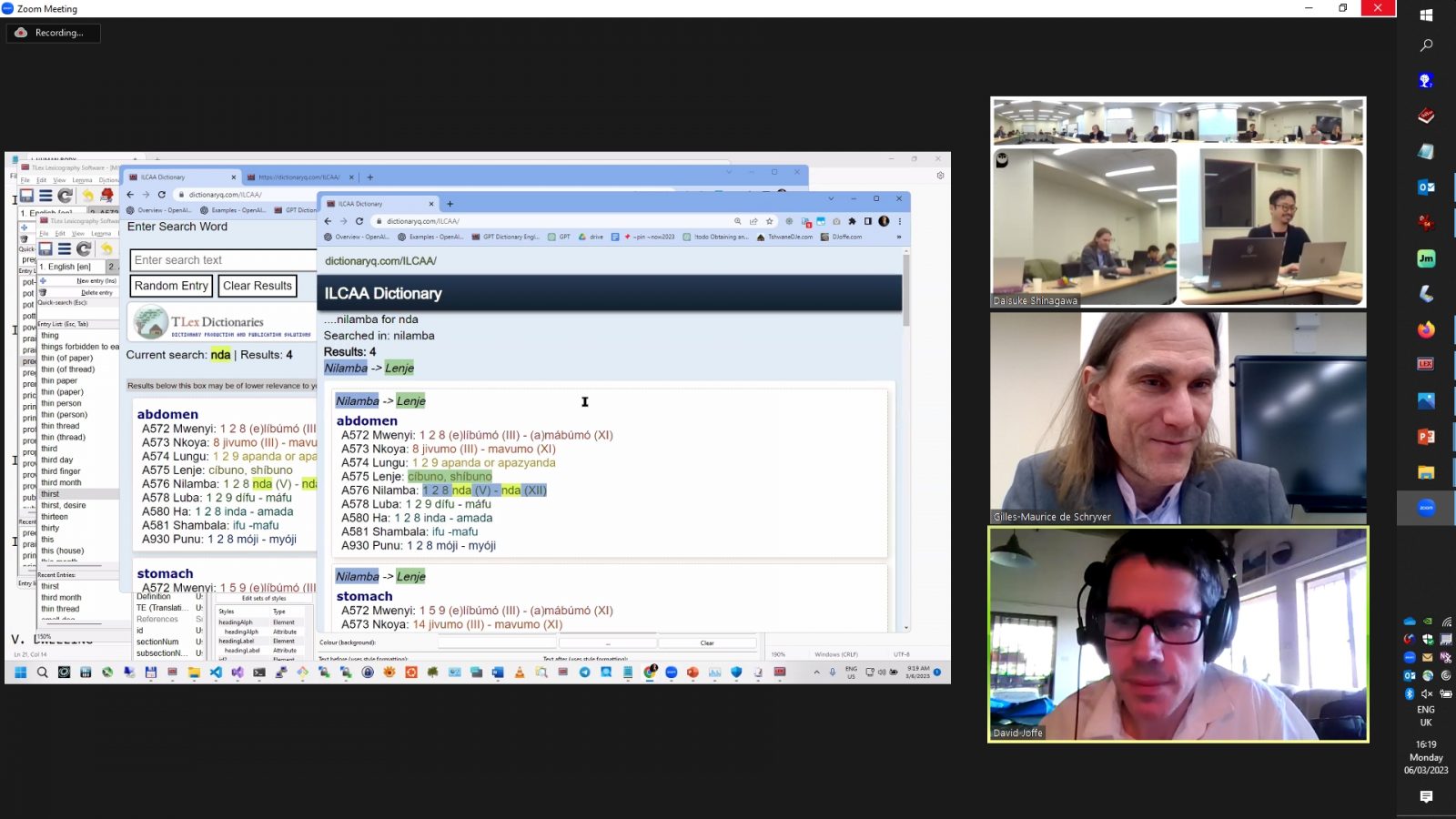

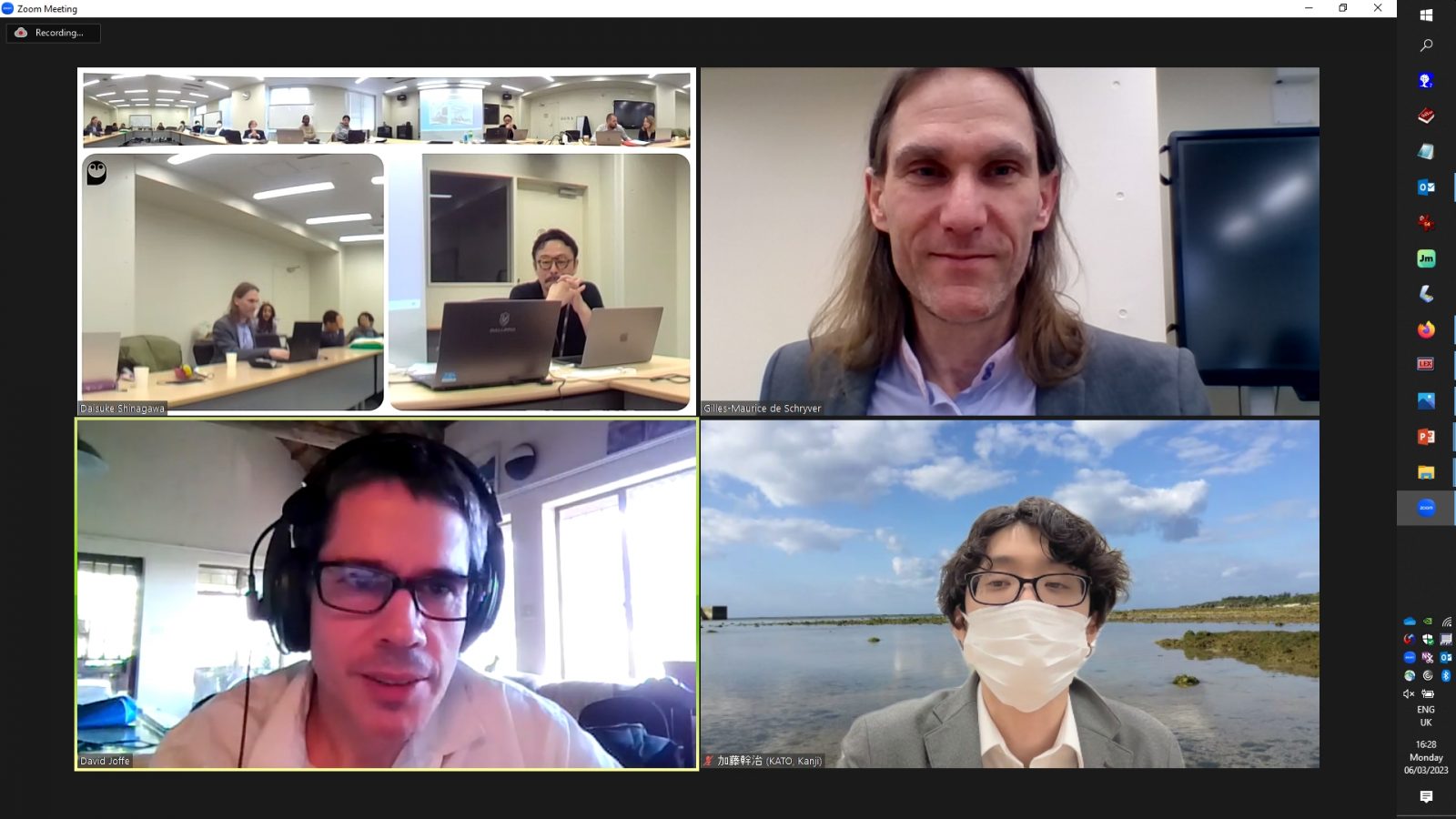





Alphaconceptual+ combined with hub-and-spoke lexicography to produce a new type of online dictionary -
Thu23Feb202310:00 amVergaderzaal 3.30 Camelot, Campus Boekentoren, gebouw 05.03 - Blandijn, Blandijnberg 2, 9000 Ghent
BantUGent research seminar with Sara Pacchiarotti & Heidi Goes on The reconstruction of Proto-WCB independent and possessive pronouns
Show contentWhat? BantUGent research seminar
When? February 23, 2023
Where? Camelot, Blandijn, Blandijnberg 2, Gent
Who? Sara Pacchiarotti & Heidi Goes on The reconstruction of Proto-WCB independent and possessive pronouns for speech act participants: does morphological evidence support lexicon-based phylogenetic groupings?We prefer to welcome you in real life, but if you cannot make it, you can follow online through MS Teams. Ask Sifra Van Acker to get the link.
-
Thu26Jan20233:00 pmFaculty Room - Campus Boekentoren - Blandijn, Blandijnberg 2, 9000 Ghent
BantUGent research seminar with Hilde Gunnink on Auxiliary constructions in Southern Bantu
Show contentWhat? BantUGent research seminar
When? January 26, 2023, 3pm
Where? Faculty Room (first floor Blandijnberg 2)
Hilde Gunnink (UGent) will give a talk on Auxiliary constructions in Southern Bantu.We prefer to welcome you in real life, but if you cannot make it, you can follow online through MS Teams. Ask Sifra Van Acker to get the link.
-
Thu24Nov20222:00 pmFaculty Room - Campus Boekentoren - Blandijn, Blandijnberg 2, 9000 Ghent
BantUGent research seminar with Lorenzo Maselli: Notes on labial-velar consonants in Sakata
Show contentWhat? BantUGent research seminar
When? November 24 2022, 14am
Where? Faculty Room (first floor, Blandijnberg 2)
Who? Lorenzo Maselli will share notes on labial-velar consonants in Sakata. There is room for one more communication.We prefer to welcome you in real life, but if you cannot make it, you can follow online through MS Teams. Ask Lorenzo Maselli for the link.
-
Tue08Nov20222:00 pmCamelot, Room 3.30, third floor Blandijn building, Blandijnberg 2, 9000 Ghent
BantUGent research seminar with talk Rasmus Bernander (Gothenburg & Helsinki University) on possibility adverbs in East African Bantu
Show contentWhat? BantUGent research seminarWhen? November 8 2022, 2pm
Where? Camelot (room 3.30) (third floor Blandijnberg 2)Rasmus Bernander (Gothenburg & Helsinki University) will give a talk on Possibility adverbs in East African Bantu - a typological-comparative overview.We prefer to welcome you in real life, but if you cannot make it, you can follow online through MS Teams. Ask Sifra Van Acker for more information.
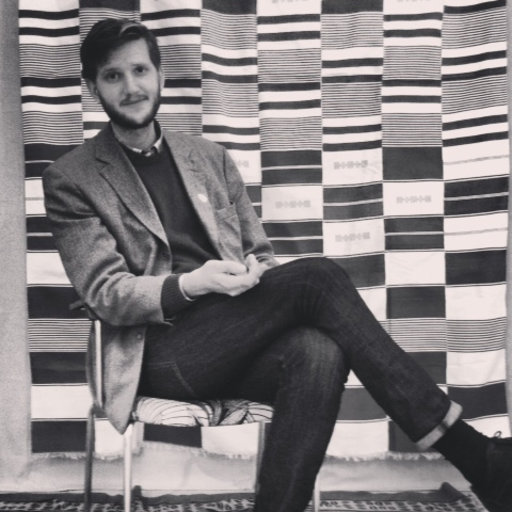
-
Thu27Oct202210:00 amFaculty Council Room - first floor Blandijn, Blandijnberg 2, 9000 Ghent
BantUGent research seminar with Guy Kouarata (nasalization in Teke) and Peter Coutros (archaeological fieldwork DRC)
Show contentWhat? BantUGent research seminarWhen? October 27, 2022Where? Faculty Council Room (first floor Blandijn)10-10:45am Guy Kouarata (BantUGent): Progressive Nasalization in the Teke B70 and B62 languages10:45-11:30am: Peter Coutros (BantUGent): Mapping the archaeological landscape of the Kwilu-Kasai river network: 2022 mission results
We prefer to welcome you in real life, but if you cannot make it, you can follow online. Ask Lorenzo Maselli for the link.
-
Fri21Oct20221:00 pmBlandijn 0.3 (100.028)
BantUGent talk Bruce Connell (York University, Toronto) — Documenting Sound Systems in Africa
-
Wed28Sep20222:00 pmRoom 2.23 Panopticon, Blandijnberg 2, 9000 Ghent + online
BantUGent research seminar with talk Makoto Furumoto and Malin Petzell on the perfective in Zalamo and Makunduchi
Show contentWhat? BantUGent research seminarWhen? September 28, 2022Where? Room 2.23 Panopticon, Blandijnberg 2, 9000 Ghent + online (code: LVbZmX)3-4 pm: Makoto Furumoto (ILCAA, Tokyo) and Malin Petzell (University of Gothenburg): Exploring the diachronic link of the perfective between Zalamo and Makunduchi.Contact:
Sifra Van Acker (sifra.vanacker@ugent.be)
Lorenzo Maselli (lorenzo.maselli@ugent.be)
-
Tue06Sep202216:00:00-18:30:00online + Campus du Solbosch, bâtiment AY - Salle AY.2.112 50, avenue F. Roosevelt – 1050 Bruxelles
Public PhD defense Mandela Kaumba Mazanga
Show contentOn September 6, 2022 (4pm CET), Mandela Kaumba Mazanga (BantUGent, ULB, UNILU) defends her PhD dissertation titled “Production et circulation de la céramique des trois derniers siècles dans l’aire kongo : une approche combinée des données ethnographiques, muséales et archéologiques”, which she wrote under the co-supervision of Prof. Koen Bostoen (BantUGent), Prof. Pierre de Maret (ULB) and Prof. Olivier Gosselain (ULB). The jury members are Prof. Placide Mumbembele (Université de Kinshasa, Institut des Musées Nationaux du Congo), Prof. Inge Brinkman (UGent), and Prof. Alexandre Livingstone-Smith (RMCA, ULB). The joint UGent-ULB PhD research of Mandela Kaumba Mazanga was financed by the ERC-SG KongoKing project. To attend the defense online, please click here.
Le 6 septembre 2022 (16h CET), Mandela Kaumba Mazanga (BantUGent, ULB, UNILU) soutiendra sa thèse de doctorat intitulée “Production et circulation de la céramique des trois derniers siècles dans l’aire kongo : une approche combinée des données ethnographiques, muséales et archéologiques”, qu'elle a rédigée sous la co-directeurs des Professeurs Koen Bostoen (BantUGent), Pierre de Maret (ULB) et Olivier Gosselain (ULB). Les membres du jury sont le Prof. Placide Mumbembele (Université de Kinshasa, Institut des Musées Nationaux du Congo), la Prof. Inge Brinkman (UGent), et le Prof. Alexandre Livingstone-Smith (RMCA, ULB). La recherche doctorale de Mandela Kaumba Mazanga a été faite en co-tutelle entre l'UGent et l'ULB et a été financée par le projet ERC-SG KongoKing. Pour participer à la soutenance en ligne, veuillez cliquer ici.
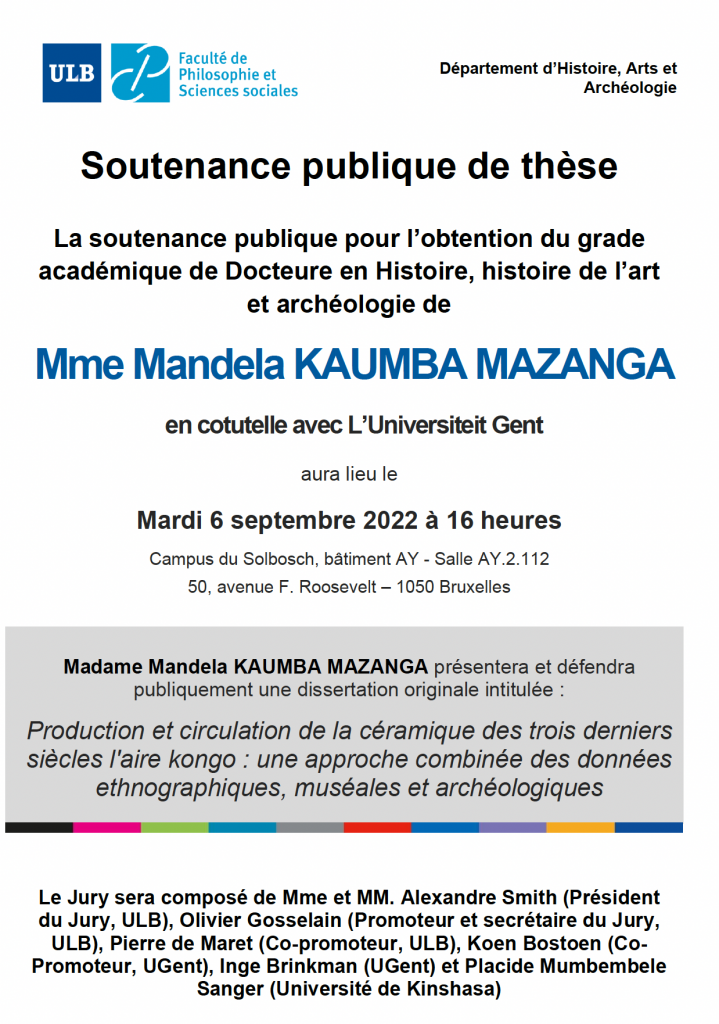
-
Mon05Sep20225:00 pmPlateauzaal, Plateaustraat, Ghent University
Meet the PhD Jury – Placide Mumbembele: “Le retour du masque Kakungu en RDC”
Show content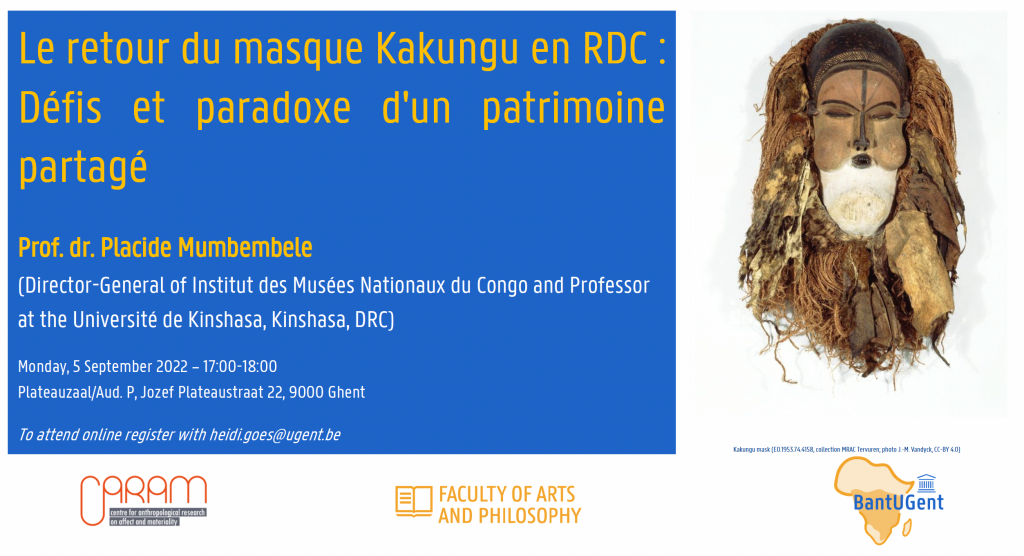
On September 6, 2022, Mandela Kaumba Mazanga defended her PhD dissertation at Brussels University. It was the completion of her joint PhD project between UGent and ULB as part of the KongoKing project. At the occasion of her PhD defense, BantuGent and CARAM co-organized a Meet the PhD Jury event with Prof. dr. Placide Mumbembele (IMNC-UNIKIN, Kinshasa), one of the jury members. He talked on the Congolese mask that was recently brought back to the DRC as part of the royal mission of
Part 1
Part 2
-
Thu01Sep2022Fri02Sep2022Ghent University
International BantUGent-ILCAA Joint Research Workshop
Show content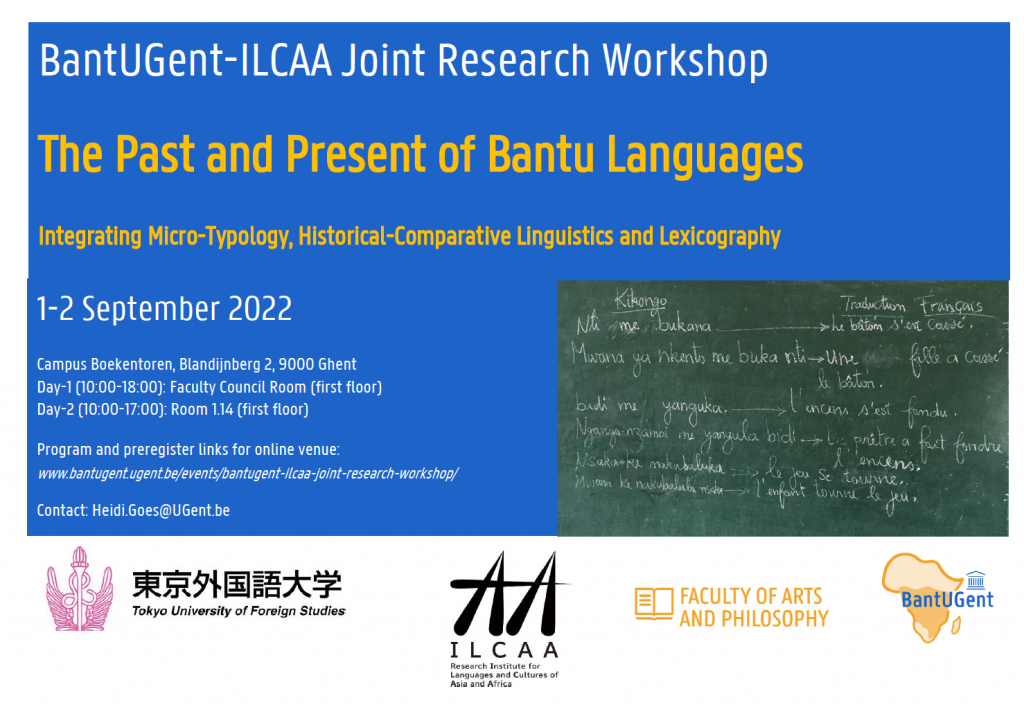
Participation is free, but please register here.
Day-1
Venue Day-1: Faculty Council Room on the first floor of the Blandijn building (Campus Boekentoren, building 05.03, Blandijnberg 2, 9000 Ghent)
Online Venue Day-1: https://us02web.zoom.us/meeting/register/tZcsc-yrqzkuHNWdNjlMtiauNDQtqA2R7f5N
(please visit the preceding URL for pre-registration)
Session 1: 10:00-12:00
Guy Kouarata (BantUGent): "The loss of Proto-Bantu *ng and the subgrouping of the Teke (B70) Languages"
Makoto Furumoto (ILCAA) and Yasunori Takahashi (Kobe University): "Emergence of the conjoint/disjoint distinction in Kimakunduchi"
Daisuke Shinaagwa (ILCAA): "Internal variation of negation systems and historical branching of Kilimanjaro Bantu languages"
Session 2: 13:00-15:30
Gastor Mapunda (UDSM): "Updating the Ngoni-Swahili-English Dictionary Project"
Sifra Van Acker (BantUGent): "The Introduction of sugarcane in Central Africa: Historical-Linguistic Insights from West-Coastal Bantu"
Jeffrey Wills (Ukrainian Catholic University): "Venda doublets and Kalanga contact"
Barbara Westerveld (BantUGent): “NLP and ML as research methods for African Linguistics”
Session 3: 16:00-18:00
Yuka Makino (ILCAA/JSPS): "Lamba in Doke's era and the present day Lamba"
David Kopa wa Kopa (ULB, UNIKIS) and Birgit Ricquier (ULB): "Contact linguistique au Bas Lualaba, au présent et au passé"
Iris Kruijsdijk (ULeiden) and Maarten Mous (ULeiden): "The complex history of Mbugwe (F34, Tanzania)"
Day-2
Venue Day-2: Room 1.14 on the first floor of the Blandijn building
Online Venue Day-2: https://us02web.zoom.us/meeting/register/tZwpdeGtrD4qHtSfBFgi-kLnwNoNLJt2Owd2
(please visit the preceding URL for pre-registration)
Session 4: 10:00-12:00
Ndongo Koza Josué (ISP-Gombe, Kinshasa) and Jean-Pierre Donzo Bunza (ISP-Gombe, Kinshasa): "La syllabe fermée en ngɔng de Katika (Bantu B864)"
[Marie Faustine Beloko (ISP-Gombe, Kinshasa) and Jean-Pierre Donzo Bunza (ISP-Gombe, Kinshasa): "L’évolution des consonnes de lɔɔnga, langue bantu de la cuvette centrale de la RD Congo"]cancelled
Sara Pacchiarotti (BantUGent): "Melodic H tone in Ngwi (Bantu B861, DRC)"
Session 5: 13:30-15:30
[Mary Zacharia Charwi (UDSM): "Morphosyntactic Analysis of Subject Marker Position in Bantu Verb Structure"]cancelled
Minah Nabirye (BantUGent): "Syntactic Reduplication in Lusoga"
Hilde Gunnink (BantUGent): "Inclusory conjunction in Bantu and beyond"
Koen Bostoen (BantUGent): "Causative/inchoative verb alternations in Ngwi (West-Coastal Bantu, B861) and the relics of the Proto-Bantu verbal derivation system"
Session 6: 16:00-17:00
General discussion: "Wrap-up and perspectives for outcome of the project"
This event is organised and financially supported by the FWO-JSPS Bilateral Project "The Past and Present of Bantu Languages: Integrating Micro-Typology, Historical-Comparative Linguistics and Lexicography"*. It is co- orgenised by the UGent Centre for Bantu Studies (BantUGent) and ILCAA's core project of linguistics "Description and Documentation of Language Dynamics in Asia and Africa: Toward a More In-depth Understanding of the Languages and Cultures of People Living in Asia and Africa (DDDLing)".
* 'The Past and Present of Bantu Languages: Integrating Micro-Typology, Historical-Comparative Linguistics and Lexicography' is a bilateral joint research program funded by the Japan Society for the Promotion of Science (JSPS) in association with the Research Foundation – Flanders (FWO)
-
Mon13Jun20221:30 pm Faculty Council Room or via Zoom
BantUGent research seminar with talks by Mary Charwi (DUCE) on Kuria (JE43) and Joseph Koni Muluwa (ISP Kikwit) on Nsambaan (B85F)
Show contentWhat? BantUGent research seminarWhen? June 13, 2022Where? Faculty Council Room (first floor Blandijnberg 2) or via Zoom (passcode: Vy1hwSzK)1:30-2:15 pm: Mary Charwi (Dar es salaam University College of Education - DUCE): An Ethnobotanical and Ethnolinguistic Study of Kuria Medicinal Plants2:15-2:45 pm: Joseph Koni Muluwa (Institut Supérieur Pédagogique de Kikwit): Diachronic sound change in Nsambaan (Bantu B85F)
Contact
Lorenzo Maselli (lorenzo.maselli@ugent.be)
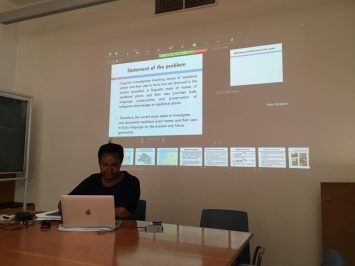
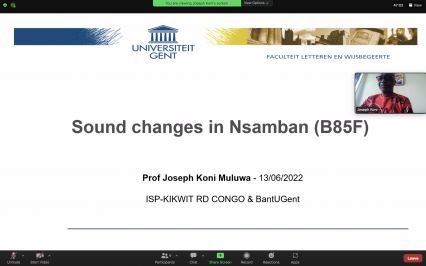
-
Fri20May202210:00 amFaculty council room, first floor Blandijn building, Blandijnberg 2, 9000 Ghent
BantUGent talk Jeroen Dewulf (UC Berkeley) — Flying Back to Africa or Flying to Heaven? Competing Visions of Afterlife in the Lowcountry and Caribbean Slave Societies
Show contentOn May 20, 2022 Prof. Jeroen Dewulf, Professor at the UC Berkeley Department of German & Dutch Studies and also active in the fields of African Studies and Latin American Studies, visits BantUGent for a public talk. Title and abstract below. A recording of the talk is available here.
Flying Back to Africa or Flying to Heaven? Competing Visions of Afterlife in the Lowcountry and Caribbean Slave Societies
This study presents a new interpretation of the famous folktale about enslaved Africans flying home, including the legend that only those who refrained from eating salt could fly back to Africa. It rejects claims that the tale is rooted in Igbo culture and relates to suicide as a desperate attempt to escape from slavery. Rather, an analysis of historical documents in combination with ethnographic and linguistic research makes it possible to trace the tale back to West-Central Africa. It relates objections to eating salt to the Kikongo expression curia mungua "to eat salt", meaning baptism, and claims that the tale originated in the context of discussions among the enslaved about the consequences of a Christian baptism for one’s spiritual afterlife.
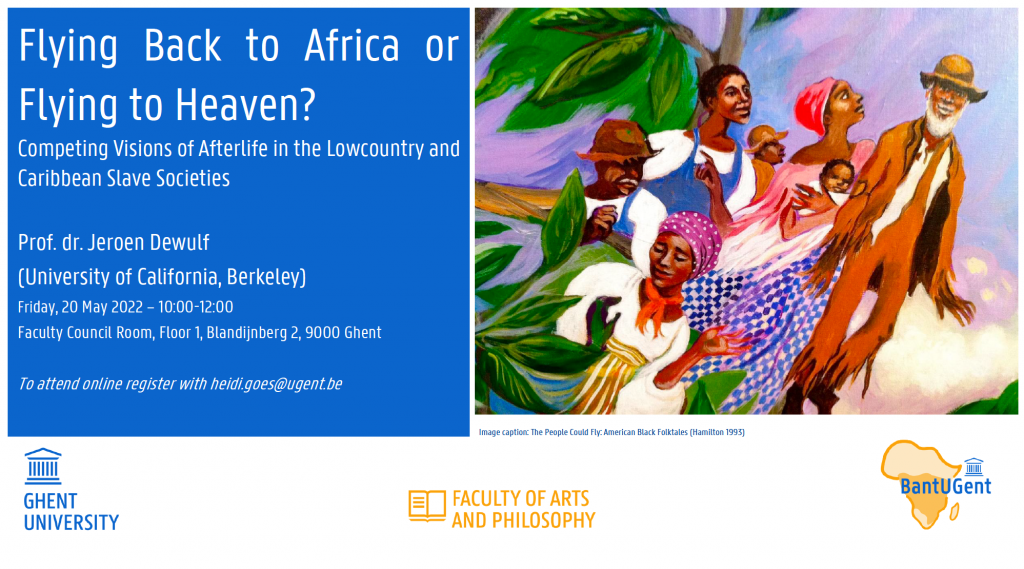
-
Mon02May20221:30 pmVergaderzaal 3.30 Camelot, Campus Boekentoren, gebouw 05.03 - Blandijn, Blandijnberg 2, 9000 Ghent
BantUGent talk Hilde Gunnink (UGent) — Language contact and linguistic reconstruction: (Pre)historic Bantu-Khoisan interactions in Southern Africa in a historical linguistic perspective
-
Mon02May20222:30 pmVergaderzaal 3.30 Camelot, Campus Boekentoren, gebouw 05.03 - Blandijn, Blandijnberg 2, 9000 Ghent
BantUGent talk Guy Kouarata (UGent) — Expression des temps en Bekwel (A85)
-
Fri22Apr20222:00 pmAuditorium P, Jozef Plateaustraat 22, 9000 Gent
Public PhD defense Michel Onokoko
Show content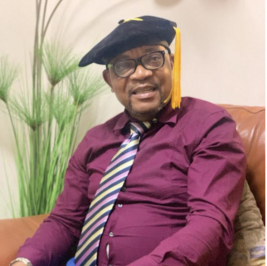
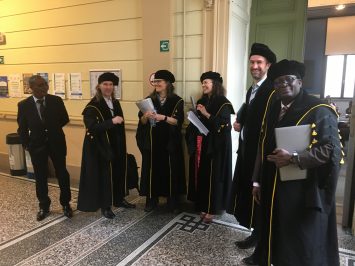
On April 22, 2022 (2pm CET), Michel Onokoko (BantUGent) defends his PhD dissertation titled "Éléments de description de la phonologie et de la morphologie du cíbìnjì cyà ngúsú, langue bantoue (L231) du Kasaï Central, R.D. Congo”, which he wrote under the co-supervision of Prof. Koen Bostoen (BantUGent) and Prof. Joseph Koni Muluwa (ISP Kikwit - BantUGent). The jury members are Prof. Timotee Mukash Kalel (Université de Kinshasa), Prof. Maud Devos (Royal Museum for Central Africa, Tervuren & UGent), Dr. Rozenn Guérois (LLACAN, CNRS, Paris), and Dr. Guy Kouarata (UGent). The president of the jury is Prof. Jo Van Steenbergen (UGent) and the secretary Prof. Gilles-Maurice de Schryver (UGent).
This event can also be followed online through MS Teams. More info: koen.bostoen@ugent.be
The ceremony will be followed by a reception (near the Faculty Council, Blandijnberg 2, first floor)
Le 22 avril 2022 (14h00 CET), Michel Onokoko (BantUGent) soutient sa thèse intitulée "Éléments de description de la phonologie et de la morphologie du cíbìnjì cyà ngúsú, langue bantoue (L231) du Kasaï Central, R. D. Congo", qu'il a rédigée sous la co-direction du Prof. Koen Bostoen (BantUGent) et du Prof. Joseph Koni Muluwa (ISP Kikwit - BantUGent). Les membres du jury sont le Prof. Timotee Mukash Kalel (Université de Kinshasa), la Prof. Maud Devos (Musée royal de l'Afrique centrale, Tervuren & UGent), la Dr. Rozenn Guérois (LLACAN, CNRS, Paris) et le Dr. Guy Kouarata (UGent). Le président du jury est le Prof. Jo Van Steenbergen (UGent) et le secrétaire le Prof. Gilles-Maurice de Schryver (UGent).
Cet événement peut également être suivi en ligne via MS Teams. Plus d'informations : koen.bostoen@ugent.be
La cérémonie sera suivie d'une réception (près du Conseil de la Faculté, Blandijnberg 2, premier étage).
-
Tue19Apr20221:00 pmRoom 2.24, Blandijnberg 2
CARAM-BantUGent talk Talia Lieber "Cattle Visions: The Creation and Collection of Art in the Kingdom of Rwanda"
Show contentThis talk examines the art of the Rwandan kingdom in the Great Lakes Region of eastern Africa, investigating how environmental and political conditions in the late 19th and early 20th centuries, including encounters with European missionaries and colonial powers, shaped artistic creativity in Rwanda. Ultimately, the talk will consider the following questions: How was the image of the kingdom transformed by Rwandese artists? What can material objects reveal about Rwanda’s heritage and state formation? How and why did artwork impact Rwandan and European perceptions of the kingdom more broadly? The talk draws, in part, from images and objects held in the archives and collections of the Smithsonian Institution, including photographs and films taken by White Fathers missionaries in Rwanda. Through object-based examinations and archival research, this talk examines how Rwandese artists rendered images of power and prosperity through works depicting cattle and reflecting surrounding landscapes that shaped both Rwandan and European notions of the kingdom.
Talia Lieber is a PhD Candidate in the Department of Art History at the University of California, Los Angeles (UCLA), where she specializes in the arts of the African continent. Originally from Washington, D.C., Talia earned her M.A. degree in Art History from UCLA (2019) and her B.A. in International Relations and Art History from Tufts University (2013). Her dissertation research on the art of Rwanda has been generously supported by the Smithsonian Institution, the Fulbright Program, and UCLA. She has assisted with African art exhibitions at the National Museum of African Art, the Baltimore Museum of Art, and the Los Angeles County Museum of Art, and served as Co-Editor-In-Chief of Ufahamu: A Journal of African Studies.
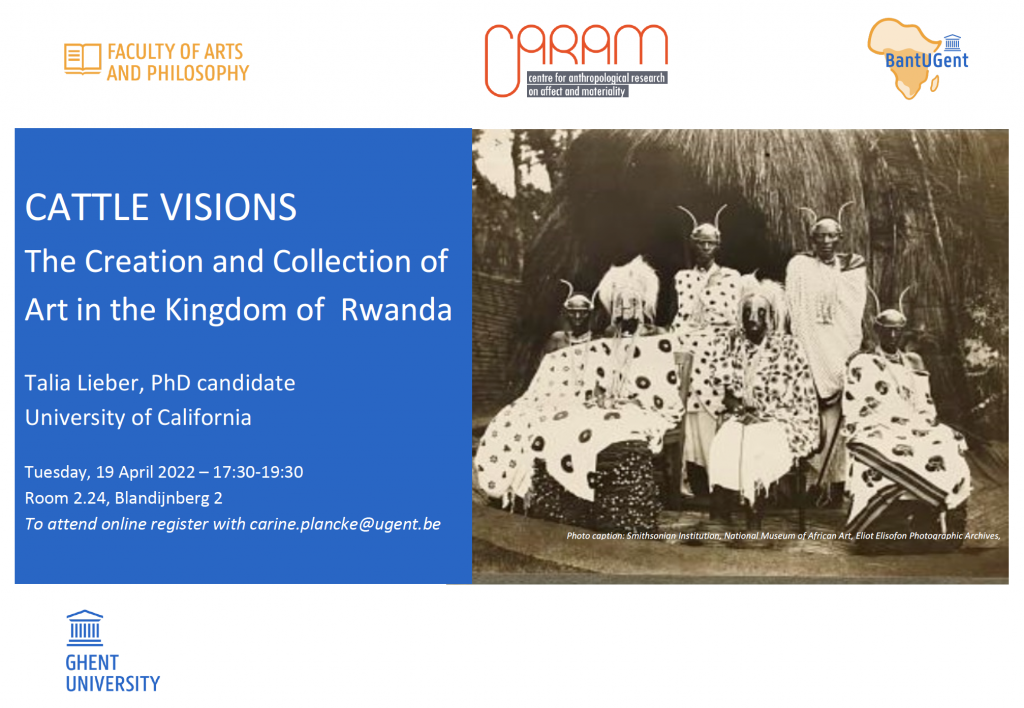
-
Fri01Apr20229:30 amAuditorium P, Jozef Plateaustraat 22, 9000 Gent
Public PhD defense Heidi Goes
Show contentOn April 1, 2022 (9.30 am CET), Heidi Goes (BantUGent) defends her PhD dissertation titled "A historical-comparative approach to phonological and morphological variation in the Kikongo Language Cluster, with a special focus on Cabinda”, which she wrote under the co-supervision of Prof. Koen Bostoen (BantUGent) and Prof. Gilles-Maurice de Schryver (BantUGent). The jury members are Prof. Bruce Connell (York University), Prof. Nobuko Yoneda (Osaka University), Prof. Joseph Koni Muluwa (ISP Kikwit), Prof. Mark Janse (UGent) and Dr. Guy Kouarata (UGent). The president of the jury is Prof. Jo Van Steenbergen (UGent) and the secretary Dr. Hilde Gunnink (UGent).
This event can also be followed online through MS Teams. More info: heidi.goes@ugent.be
The ceremony will be followed by a reception (near the Faculty Council, Blandijnberg 2, first floor)
Please confirm your presence using this link (https://webappsx.ugent.be/eventManager/events/cabinda), at the latest Wednesday at noon (23/3/2022).
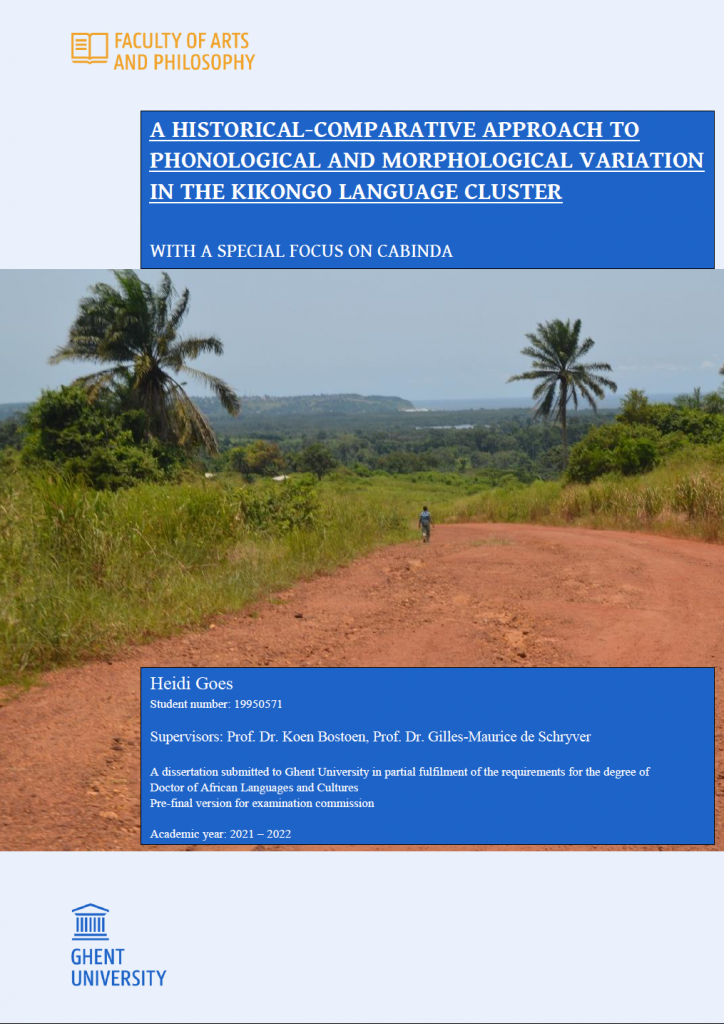
-
Fri01Apr20222:00 pmvideo-conferencing
Public PhD defense Bruna da Silva
Show contentOn April 1, 2022, Bruna da Silva (BantUGent) defends her PhD dissertation titled "Specialised Digital Frame-Based Lexicography from the Perspective of Dictionary Use Research”, which she wrote under the co-supervision of Prof. Gilles-Maurice de Schryver (BantUGent) and Rove Luiza de Oliveira Chishman (Vale do Rio dos Sinos University, Brazil). The jury members are Dr. Tanara Zingano Kuhn (University of Coimbra, Portugal), Prof. Larissa Moreira Brangel (Federal University of Rio Grande do Sul, Brazil), Prof. Timothy Colleman (Ghent University, Belgium), and Prof. Sandro José Rigo (UNISINOS University, Brazil).
This event takes place via video-conferencing, with Teams.
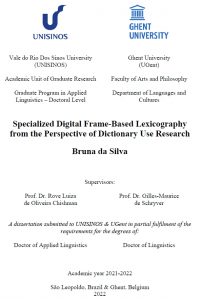
-
Mon28Mar202212:30 pm Simon Stevin Room, Plateau-Rozier, Jozef Plateaustraat 22, 9000 Ghent
BantUGent research seminar with Lorenzo Maselli & Véronique Delvaux on retroflex nasals in Boma and Nunu and Michel Onokoko on Cibinji
Show contentWhat? BantUGent research seminarWhen? March 28, 2022Where? Simon Stevin Room, Plateau-Rozier, Jozef Plateaustraat 22, 9000 Ghent (online through Zoom, passcode: 14LLVJiP)1:30-2:15 pm: Lorenzo Maselli (BantUGent) & Véronique Delvaux (Université Mons): Retroflexion in the Mai-Ndombe: preliminary and methodological remarks on the case of North Boma and Nunu nasals2:15-2:45 pm: Michel Onokoko (BantUGent): Éléments de description de la phonologie et de la morphologie du cíbìnjì cyà ngúsú, langue bantoue (L231) du Kasaï Central, R.D. Congo (dry run PhD defense)
Contact
Lorenzo Maselli (lorenzo.maselli@ugent.be)
-
Thu24Mar2022Fri25Mar2022Auditorium P Jozef Plateau (Jozef Plateaustraat 22) Ghent University, Belgium
International Workshop "Rethinking Time and Gender in African History"
-
Wed23Mar20222:00 pmSimon Stevin Room, Plateau-Rozier, Jozef Plateaustraat 22, 9000 Ghent
Angi Ngumbu talks on how linguistics impacts the lives of the speakers of minority languages in DRC
Show contentWhat? BantUGent research seminarWhen? March 23, 2022, 2pm
Where? Simon Stevin Room, Plateau-Rozier, Jozef Plateaustraat 22, 9000 Ghent (online through Zoom, passcode: KG14YtTh)Angi Ngumbu (The Seed Company) visits BantUGent on Wednesday March 23 and will give a talk titled "Applied Linguistics: Stories of how linguistics is impacting the lives of the speakers of minority languages in DRC"
Angi Ngumbu has been working as a linguist and project manager in the two Congos (Brazzaville and Kinshasa) for 15 years. She will share about the different projects she has worked on during this time in applied linguistics, from picture dictionaries, language documentation, survey, and orthography development. Some of this work has been directly influenced by or done in collaboration with personnel from Ghent University.
Venue: Simon Stevin Room
Contact: koen.bostoen@ugent.be
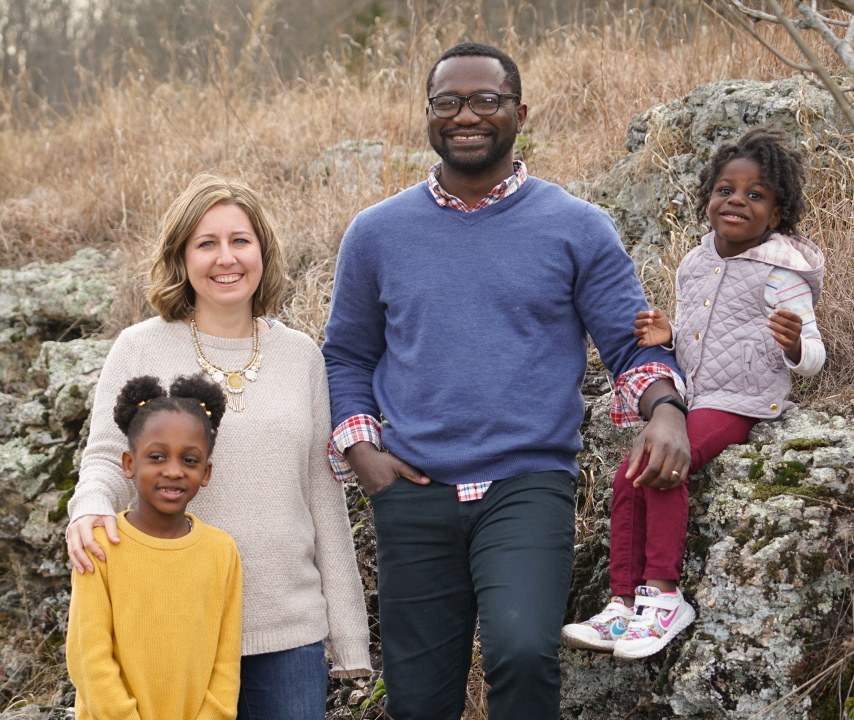
-
Sat12Mar20226-7pmKunstencentrum VOORUIT or through live-stream
Monster: Other/Alternative (dance rehearsal/debate: with Harold George, Dunia Dance Theatre & AfriKeraArts) - Internationalisation@Home initiative organized by Inge Brinkman
Show content2 Workshops with choreographer Harold George in de Vooruit. Contact Amber.Frateur@UGent.befor information
A dance rehearsal/debate: with Harold George, Dunia Dance Theatre & AfriKeraArts
Registration:https://webappsx.ugent.be/eventManager/events/DANCEREHEARSAL
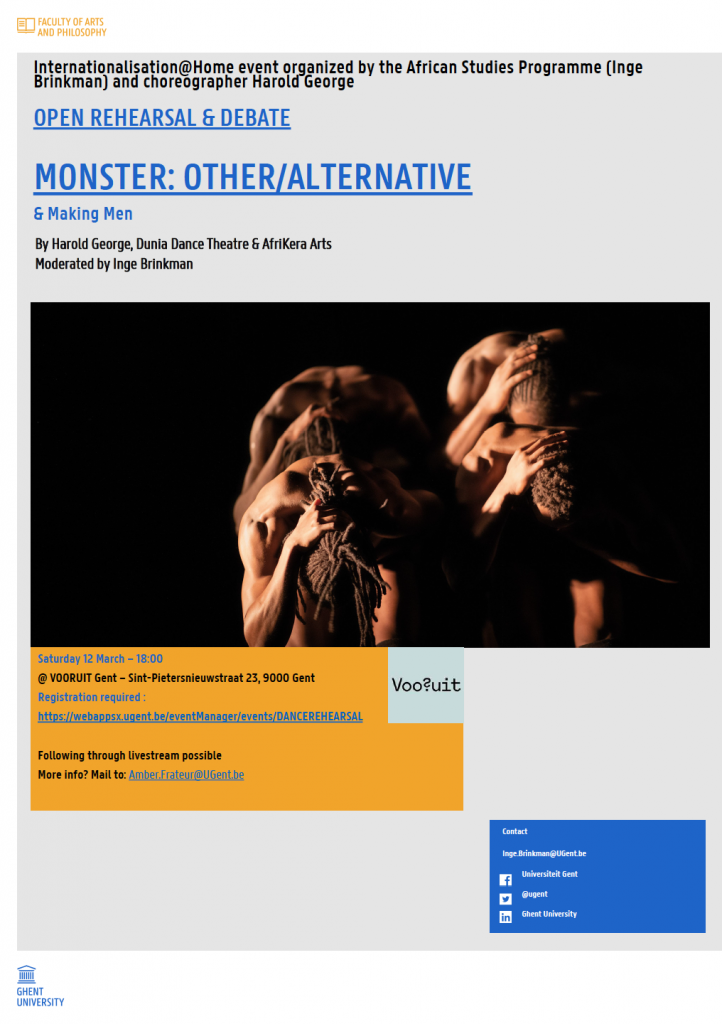
-
Mon07Mar20221:30 pmOnline
BantUGent research seminar with talks by Heidi Goes on Kikongo and Guy Kouarata on Lingála
Show contentWhat? BantUGent research seminarWhen? March 7, 2022Where? Only online through Zoom1:30-2:15 pm: Heidi Goes (BantUGent): A historical-comparative approach to phonological and morphological variation in the Kikongo Language Cluster with a special focus on Cabinda (dry run PhD defense)2:15-2:45 pm: Guy Kouarata (BantUGent): Xenisms, borrowings and lexical hybrids in Lingála
Contact
Lorenzo Maselli (lorenzo.maselli@ugent.be)
-
Tue01Mar20221pm-3:45pmBlandijn room 0.2 or through live-stream
Monster: Other/Alternative (lecture) - Internationalisation@Home initiative organized by Inge Brinkman
Show contentA lecture: “Monster: Other/Alternative” by Inge Brinkman
Registration: https://webappsx.ugent.be/eventManager/events/MonsterOtherAlternative
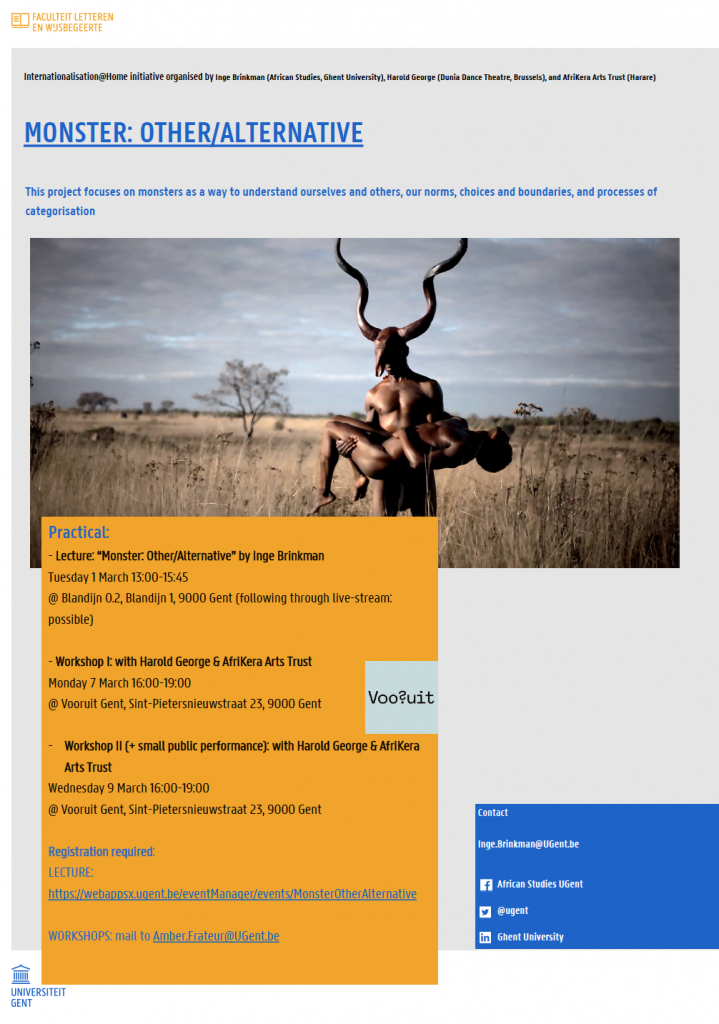
-
Mon07Feb20221:30 pmOnline (Zoom)
BantUGent research seminar with talks by Sebastian Dom on Bantu causatives and Guy Kouarata on Lingála
Show contentWhat? BantUGent research seminarWhen? February 7, 2022Where? Only online through Zoom (Passcode: AnUWT8dw)1:30-2:15 pm: Sebastian Dom (Gothenburg University): Synchronic and diachronic variation in the coding of the noncausal/causal alternation: Causative *-i in East Bantu languages2:15-2:45 pm: Guy Kouarata (BantUGent): Xenisms, borrowings and lexical hybrids in Lingála (canceled)
Contact
Sifra Van Acker (sifra.vanacker@ugent.be)
Lorenzo Maselli (lorenzo.maselli@ugent.be)
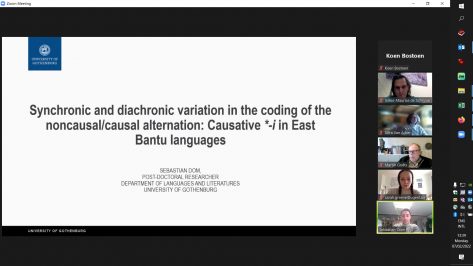
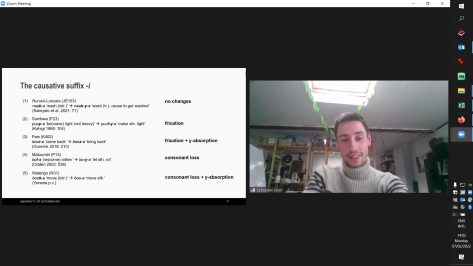
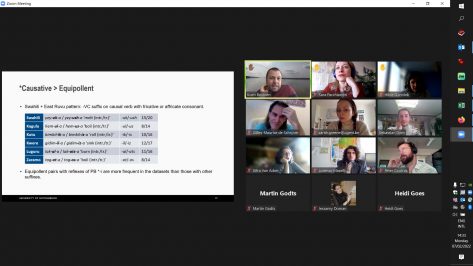
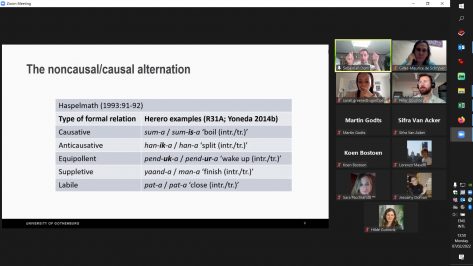
-
Mon10Jan20221:30 pmOnline (Zoom)
BantUGent research seminar with talks by Hilde Gunnink, Guy Kouarata and Michel Mbabu
Show contentWhat? BantUGent research seminarWhen? January 10, 2022Where? Only online through Zoom (Passcode: fXSPHve3)1:30-2:15 pm: Hilde Gunnink (BantUGent - Leiden University): Lateral obstruents in Bantu2:15-2:45 pm: Guy Kouarata (BantUGent): Les préfixes de classes 7 et 15 en bantou de la côte ouest : le cas des parlers téké de la RDC
2:45-3:15 pm: Michel Mbabu (ISP-Gombe, Kinshasa): Les voyelles en kiyombe (bantou H16c)
Contact
Sifra Van Acker (sifra.vanacker@ugent.be)
Lorenzo Maselli (lorenzo.maselli@ugent.be)
-
Mon06Dec20211:30 pmOnline
BantUGent research seminar with talks by Jean-Pierre Donzo and Lorenzo Maselli, Daisuke Shinagawa & Seunghun Lee
Show contentWhat? BantUGent research seminarWhen? December 6, 2021Where? Only online through Zoom1:30-2:15 pm: Jean-Pierre Donzo (ISP-Gombe, Kinshasa & BantUGent): La vie de certaines consonnes dans les langues du nord-ouest de la RD Congo2:15-2:45 pm: Lorenzo Maselli (BantUGent), Daisuke Shinagawa (Research Institute for Languages and Cultures of Asia and Africa - Tokyo) & Seunghun Lee (International Christian University - Tokyo): Post-nasal trilling in a cross-Bantu perspective
Contact
Sifra Van Acker (sifra.vanacker@ugent.be)
Lorenzo Maselli (lorenzo.maselli@ugent.be)
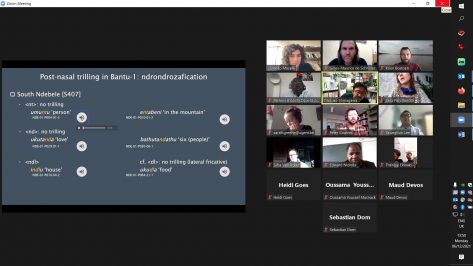
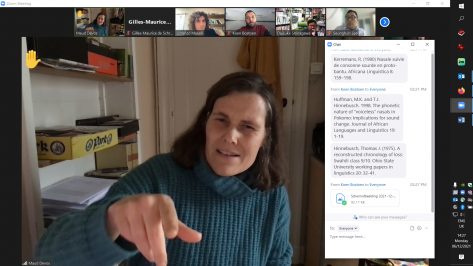
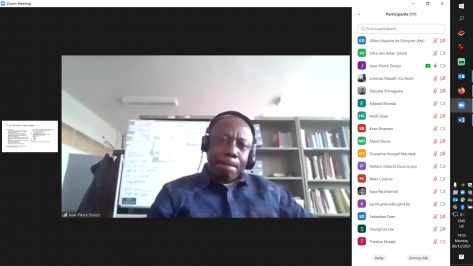
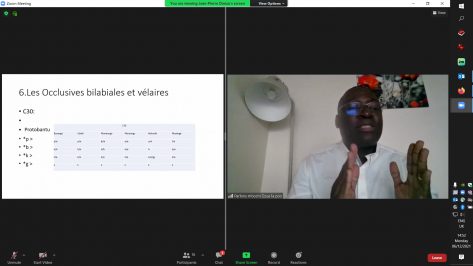
-
Thu18Nov20218:00 pmMonasterium PoortAckere, Oude Houtlei 56, 9000 Gent
Talk on History of the Bantu Languages [Dutch] - Koen Bostoen - Centre for Historical Languages Ghent
Show contentThe Bantu languages are the largest African language family, both in terms of number of languages and speakers and geographical distribution. About 350 million or about one in three Africans speak one or more of the 500 or so Bantu languages, which stretch from above the equator to South Africa. Swahili, Lingala, Kongo, Luba, Rwanda, Rundi, Ganda, Zulu, Xhosa, and Shona are just some of the best-known Bantu languages. Proto-Bantu is about 5000 years old and is said to have been born in the border area between Nigeria and Cameroon. This lecture is about the reconstruction of this hypothetical ancestral language, about the exceptionally rapid and large-scale diffusion of its daughter languages and about the history and future of the study area.
https://www.historischetalen.be/cursus/twaalf-smaakmakers/
-
Mon08Nov20211:30 pmCamelot (3.30), Campus Boekentoren, Building 05.03 – Blandijn, third floor, Blandijnberg 2, 9000 Ghent
BantUGent research seminar with Peter Coutros (archaeology), Sifra Van Acker and Sara Pacchiarotti (linguistics)
Show contentWhat? BantUGent research seminarWhen? November 8, 2021Where? Camelot (3.30), Campus Boekentoren, Building 05.03 – Blandijn, third floor, Blandijnberg 2, 9000 Ghent1:30-2:00 pm: Peter Coutros (BantUGent - BantuFirst project): 2021 archaeological reconnaissance of the West-Coastal Bantu homeland: preliminary results2:00-2:30 pm: Sifra Van Acker (BantUGent - BantuFirst project): The introduction of sugarcane in Central Africa and reconstructing the semantics of *cʊ̀ngʊ̀ in Proto-West-Coastal-Bantu2:30-2:45 pm: break2:45-3.15 pm: Sara Pacchiarotti (BantUGent - BantuFirst project): Tonal evolutions with diagnostic power for the internal classification of West-Coastal-Bantu
Contact (in case you want to attend through Zoom):
Sifra Van Acker (sifra.vanacker@ugent.be)
Lorenzo Maselli (lorenzo.maselli@ugent.be)
-
Tue26Oct20213:00 pmOnline
DiaLing talk Tajudeen Mamadou & Mariapaola D’Imperio (Rutgers University) "Intonation as Key for a More Comprehensive Sub-tonal Feature System"
Show contentFor the MS-teams link, write to Kim.Groothuis@UGent.be.
In studies on African lexical tone languages, intonation is often approached either as emergent from the cumulative effects of local interactions between sub-tonal features like the register feature (Welmers, 1959; Inkelas & al, 1986; Connell & Ladd, 1990; Clements, 1979) or as limited to domain boundary manifestations (Rialland, 2007). When global effects are mentioned, they are often treated as phonetic in nature (Inkelas & al, 1986; a.o), supposedly because they match the predictions of the Frequency Code, which holds that questions are realized with a higher pitch than statements (Gussenhoven, 2002; Cahill, 2013). Here, we present the results of a case study (production and perception) of yes/no question intonation in Ede Chaabe (cbj, Benin). We found that questions’ register is lower and not higher, but also have a L% edge tone known to characterize ‘lax’ prosody languages (Rialland, 2009); hence contrary to the Frequency Code. Considering these findings, we argue that the observed global effects are represented in the grammar in the form of a Register feature, which is treated in the present account as an intonational feature than spans specific prosodic domains. We go a step further in proposing a new sub-tonal feature model that does not use a register feature (like previous models do), but rather treats lexical tones as pitch change instructions, where Polarity (+/-) indicates the direction of the change and Step (1/2) would indicate its magnitude. In this sense, any given lexical tone (with Polarity and Step features) is projected on the intonational Register plane, post-lexically.
-
Thu14Oct20213:00 pmFaculty Room, first floor, Blandijn building, Blandijnberg 2, 9000 Gent
Talk Miguel Gutiérrez Maté (Augsburg University)
Show contentConvened by the ΔiaLing and BantUGent research groups, Miguel Gutiérrez Maté (Augsburg University) will present a talk titled "Towards a better understanding of Creoles through their comparison with fossilized learner varieties. The case of Palenquero Creole and Cabindan Portuguese”. This event is part of an Erasmus+ exchange.
Both Palenquero –a Spanish-lexified Creole spoken in the small village of San Basilio de Palenque (Colombia)– and the ‘partially restructured’ varieties of Portuguese spoken in the province of Cabinda (Angola) share the same ‘substrate’: some western varieties belonging to the Kikongo Language Cluster: cp. Schryver/Grollemund/Branford/Bostoen 2015 and Bostoen/Schryver 2018).
Thus, getting to know the structural similarities and differences between Palenquero and Cabindan Portuguese turns out to be extraordinarily helpful for the study of creolization, since it enables us to set quantitative and/or qualitative limits between the process of creolization and the fossilization of interlanguages (Selinker 1972), especially as regards the role of the substrate in the two possible outcomes (cf. Winford 2008; see Gutiérrez Maté 2020 for the particular case of the two languages compared here).
The ultimate goal of this talk is determining the different historical, sociological and attitudinal processes (i.e. the different ecologies) that account for the birth of a Creole, in one case, and a non-Creole, in the other, out of a very similar combination of contributing languages (Kikongo substrate and Ibero-Romance superstrate).
The data have been collected by the author in situ as a result of his fieldwork in Palenque (2017, 2018) and Cabinda (2019, 2020). In addition, for the case of Palenquero, the author also uses the interviews made by A. Schwegler during his first stays in the village (1985-1988), which reveal themselves as extraordinarily helpful for containing large language samples of so-called Traditional Palenquero (see Lipski 2020 about bilingualism in the village and other non- -traditional varieties of Palenquero).
Bibliography
Bostoen, Koen / Gilles-Maurice de Schryver. 2018. Seventeenth-century Kikongo is not the ancestor of present-day Kikongo. In K. Bostoen & I. Brinkman (eds.), The Kongo kingdom: the origins, dynamics and cosmopolitan culture of an African polity (pp. 60–102). Cambridge: Cambridge University Press.
Gutiérrez Maté, Miguel. 2020. De Palenque a Cabinda: un paso necesario para los estudios afroiberorrománicos y criollos. Gabriele Knauer, Alexandra Ortiz Wallner & Ineke Phaf-Rheinberger (eds.), Mundos caribeños – Caribbean Worlds – Mondes Caribéens. Madrid/Frankfurt: Iberoamericana/Vervuert, 105-138.
Lipski, John M. 2020. Palenquero and Spanish in Contact: Exploring the interface. Amsterdam/Philadelphia: John Benjamins.
Schryver, Gilles-Maurice / Grollemund, Rebecca /Branford, Simon /Bostoen, Koen. 2015. Introducing a state‑of‑the‑art phylogenetic classification of the Kikongo Language Cluster. Africana Linguistica 21: 87-162
Schwegler, Armin. 2016. Combining Population Genetics with Historical Linguistics: On the African Origins of the Latin America Black and Mulatto Populations. In: Sessarego, Sandro/Tejedo, Fernando (eds.): Spanish Language and Sociolinguistic Analysis. Amsterdam: John Benjamins.
Selinker, Larry. 1972. Interlanguage. International Review of Applied Linguistics 10(3). 209–241.
Winford, Donald. 2008. Processes of Creole formation and related contact-induced language change. Journal of Language Contact 2/1. 124-145
-
Mon04Oct20211:30 pmFaculty Room, Campus Boekentoren, Building 05.03 - Blandijn, first floor, Blandijnberg 2, 9000 Ghent
BantUGent research seminar with talk Zhen Li (ULeiden) on information structure in Teke
Show contentWhat? BantUGent research seminarWhen? October 4, 2021Where? Faculty Room, Campus Boekentoren, Building 05.03 - Blandijn, first floor, Blandijnberg 2, 9000 Ghent1:30-2:15 pm: Zhen Li (Leiden University, BaSIS project): Word order, subject marking and information structure in Teke2:15-2:45 pm: Lorenzo Maselli (BantUGent - FWO fellow): Phonetic documentation in the underexplored linguistic landscape of the Mai-Ndombe Province of the Democratic Republic of the Congo2:45-3.15 pm: Sifra Van Acker (BantUGent - BantuFirst project): The introduction of sugarcane in Central Africa and reconstructing the semantics of *cʊ̀ngʊ̀ in Proto-West-Coastal-BantuContact:
Sifra Van Acker (sifra.vanacker@ugent.be)
Lorenzo Maselli (lorenzo.maselli@ugent.be)
-
Sun20Jun2021
Talk Heidi Goes
Show contentHeidi Goes talked about her research on the Kikongo Language Cluster and her fieldwork in Cabinda on June 20, 2021, as part of a lecture series organized by the Australian Esperanto Association. Her talk is available on Youtube.
-
Wed26May2021Online
Second BantUGent-ILCAA kick-off meeting
Show contentOn May 26, 2021, BantUGent and the Research Institute for Languages and Cultures of Asia and Africa (ILCAA) in Tokyo (Japan) have the second kick-off meeting of their FWO-JSPS-funded collaborative project on “The Past and Present of Bantu Languages: Integrating Micro-Typology, Historical-Comparative Linguistics and Lexicography“.
9:30-9:40: Opening remarks
9:45-11:15: The first session
9:45-10:15 Koen Bostoen: “Suffixal phrasemes in Bantu verbal derivation”
10:15-10:45 Nobuko Yoneda: “Properties of the subject in Bantu languages”
10:45-11:15 Minah Nabirye: “Information Structure in Lusoga: New Corpus-based Research”
11:15-11:30 Coffee
11:30-13:00: The second session
11:30-12:00 Daisuke Shinagawa: “Morphosyntactic local variation in Chaga”
12:00-12:30 Gilles-Maurice de Schryver: “Bantu lexicography in Asia”
12:30-13:00 General discussion about the project’s research agenda
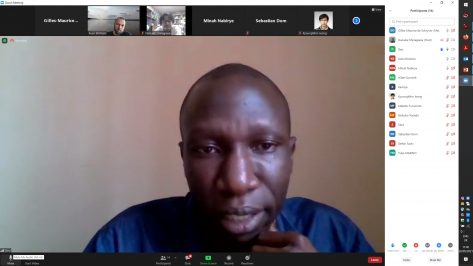
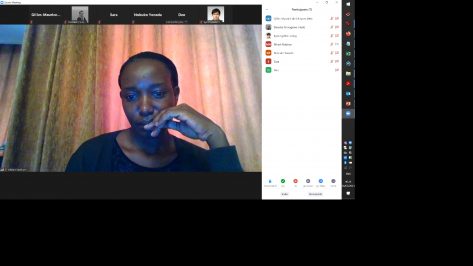
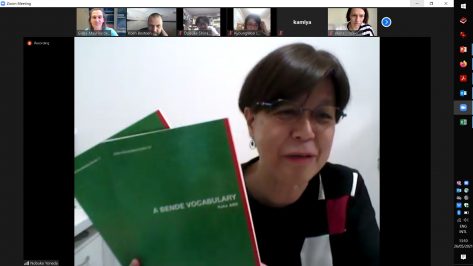
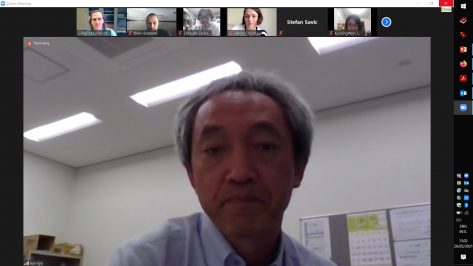
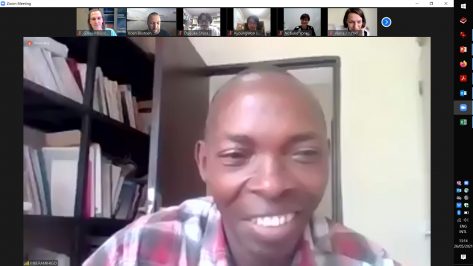
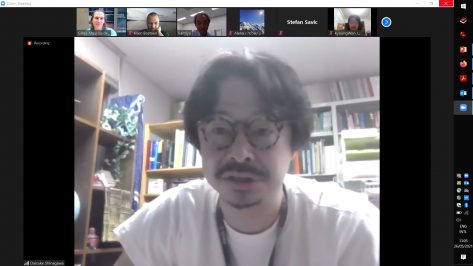
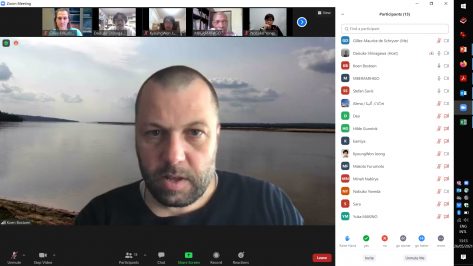
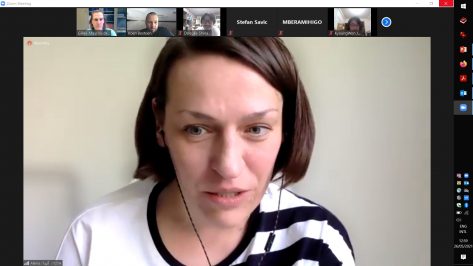
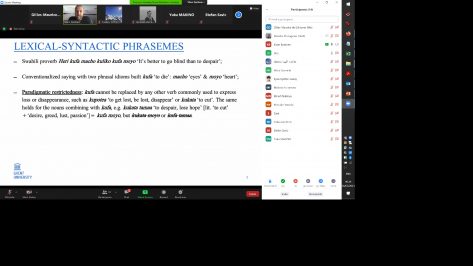
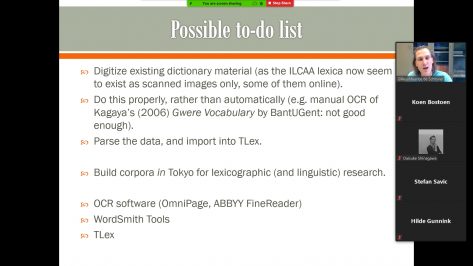
-
Wed12May2021Online
First BantUGent-ILCAA kick-off meeting
Show contentOn May 12, 2021, BantUGent and the Research Institute for Languages and Cultures of Asia and Africa (ILCAA) in Tokyo (Japan) have the first kick-off meeting of their FWO-JSPS-funded collaborative project on "The Past and Present of Bantu Languages: Integrating Micro-Typology, Historical-Comparative Linguistics and Lexicography".
The meeting is online. The Zoom link to participate can be obtained via koen.bostoen@ugent.be upon request.
9:30-9:40: Opening remarks
9:45-11:15: The first session
9:45-10:15 Sara Pacchiarotti: "Phylogenetics and the Comparative Method as tools for the internal classification of West-Coastal Bantu: results and challenges”
10:15-10:45 Lorenzo Maselli: "Phonetic and phonological research on hunter-gatherer substrate interference in the West-Coastal Bantu homeland region: some preliminary results and methodological remarks"
10:45-11:15 Kyoungwon Jeong: "Micro-parametric research on cross-Bantu phonological microvariation: a test case in Swati"
11:15-11:30 Coffee
11:30-13:00: The second session
11:30-12:00 Yuka Makino: "Contrastive analysis on the local variation of TAM expressions in M40 and M50"
12:00-12:30 Makoto Furumoto: "A synchronic and diachronic analysis of the Kimakunduchi final vowel"
12:30-13:00 Hilde Gunnink: "Language contact between migrating Bantu speakers and resident Khoisan speakers in southern Africa"
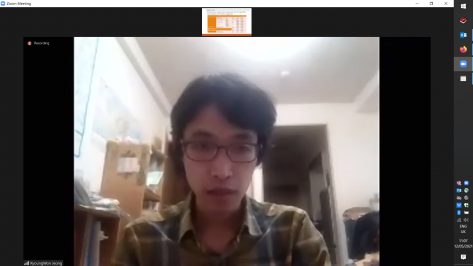
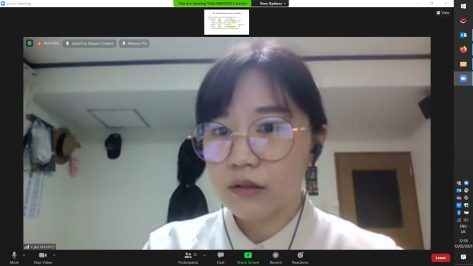
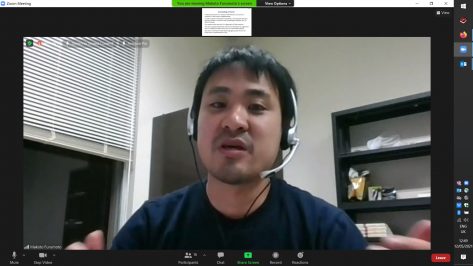
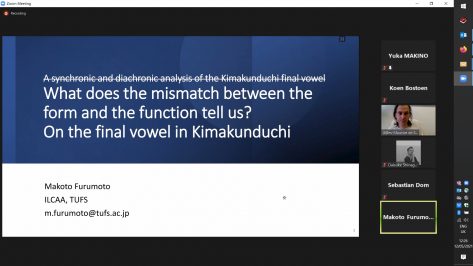




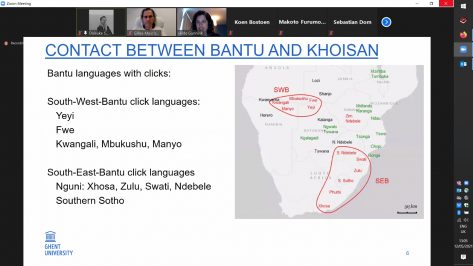
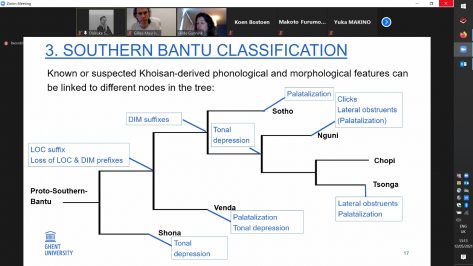
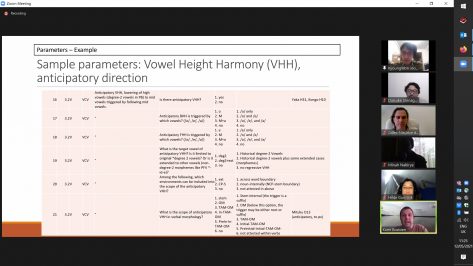
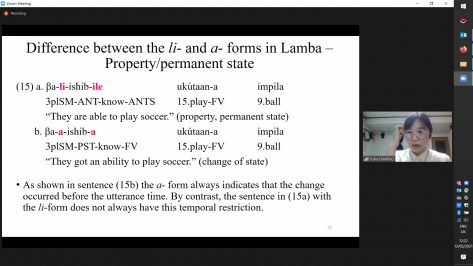
-
Mon19Nov2018Fri23Nov2018UGent, Campus Book Tower
International Conference on Reconstructing Proto-Bantu Grammar
Show content- Webpage: https://www.bantugent.ugent.be/events/orpbgconference/
- Organisation: the UGent Centre for Bantu Studies (BantUGent) and the RMCA Service of Culture & Society (Royal Museum for Central Africa in Tervuren)
- Funding: Research Foundation - Flanders (FWO), the UGent Faculty of Arts and Philosophy and the RMCA.
- Dates: November 19-23, 2018
- Venue: Ghent University, Campus Boekentoren/Book Tower
- Contact: If you would like to contact any of the presenters, click on their name below.
- Click here for a photo report of the conference by Gilles-Maurice de Schryver and his team
- Click here for a FREE download of the book 'On reconstructing Proto-Bantu grammar'
Program
MONDAY NOVEMBER 19, 2018
Venue: Jozef Plateauzaal (Jozef Plateaustraat 22)
Opening
08.30: Welcome + Registration
09.15: Opening address by the organizing committee (Koen Bostoen)
Chair: Koen Bostoen
09.30: Thilo Schadeberg (Leiden University) Reconstructing Proto-Bantu Grammar Half a Century after Meeussen (1967)
10.15: Rebecca Grollemund (University of Missouri) and Lutz Marten (SOAS) Reconstructing Proto-Bantu in the Light of the Latest Insights into Bantu Phylogeny
11.00: Coffee break
Proto-Bantu Phonology
Chair: Rozenn Guérois
11.30: Nancy Kula (University of Essex) Proto-Bantu Segmental Phonology
12.15: Gérard Philippson (DDL, Lyon) Double Reflexes’ Revisited: Implications for the Proto-Bantu Consonant System
13.00: Lunch break
14.00: Lotta Aunio (University of Helsinki) & Jacky Maniacky (RMCA, Tervuren) Proto-Bantu Nominal Tone
14.45: Michael Marlo (University of Missouri) Proto-Bantu Verbal Tone
15.30: Larry Hyman (University of California, Berkeley) Causative and Passive H tone: Spurious or Proto?
16.15: Coffee break
16.45: Round table discussion (Council Room Faculty Arts & Philosophy, Blandijnberg 2, 1st floor)
18.00: Closure
TUESDAY NOVEMBER 20, 2018
Venue: Jozef Plateauzaal (Jozef Plateaustraat 22)
Chair: Gilles-Maurice de Schryver
Proto-Bantu Verbal Form
09.30: Jeff Good (University at Buffalo) & Tom Güldemann (Humboldt University of Berlin) Proto-Bantu Verbal Form
Proto-Bantu Verbal Derivation
10.15: Roger Blench (Kay Williamson Educational Foundation) Proto-Bantu Verbal Extensions from a Bantoid Perspective
11.00: Coffee break
11.30: Sara Pacchiarotti (Ghent University) On the reconstructable main clause functions of Proto-Bantu applicative suffix *-ɪd
12.15: Rozenn Guérois (Ghent University) Proto-Bantu Passive Constructions
13.00: Lunch Break
14.00: Sebastian Dom (Ghent University) & Leonid Kulikov (Ghent University) Proto-Bantu Middle Voice: From Meeussen to Schadeberg and Beyond
14.45: Koen Bostoen (Ghent University) Non-Compositional Complex Verbal Derivation Suffixes and the Semantic Reconstruction of *-an in Proto-Bantu
15.30: Coffee Break
16.00: Round table discussion (Council Room Faculty Arts & Philosophy, Blandijnberg 2, 1st floor)
17.15: Proto-Bantu QUIZ (Sara Pacchiarotti & Koen Bostoen)
18.00: Closure
WEDNESDAY NOVEMBER 21, 2018
Excursion to the Royal Museum for Central Africa in Tervuren
Venue: CODA building, room 333, Leuvensesteenweg 17, 3080 Tervuren
08.15: Departure to Tervuren by bus (in front of main entrance Plateau building, Jozef Plateaustraat 22)
Welcome
10.15: Welcome address at the RMCA
Chair: Sebastian Dom
10.30: Maud Devos (RMCA, Tervuren) Recent Research on the Biography of Achiel Emiel Meeussen in Relation to Bantu Grammatical Reconstructions (1967)
11.15: Coffee break
Proto-Bantu Tense, Aspect and Polarity
11.30: Derek Nurse (Independent Scholar) Proto-Bantu Tense and Aspect
12.15: John Watters (SIL International) Proto-Bantu Tense from a Benue-Congo Perspective
13.00: Lunch break
14.00: Thera Crane (University of Helsinki) & Bastian Persohn (University of Hamburg) Proto-Bantu Lexical Aspect
14.45: Coffee break
15.00: Round table discussion
16:15: Guided pre-view and visit of the renovated Royal Museum for Central Africa
18.15: Back to Ghent
THURSDAY NOVEMBER 22, 2018
Venue: Council Room Faculty Arts & Philosophy, Blandijnberg 2, 1st floor
Proto-Bantu Verbal Morphosyntax
Chair: Sara Pacchiarotti
09.00: Mark Van de Velde (LLACAN, Paris) Proto-Bantu Relative Clauses
09.45: Hannah Gibson (University of Essex) Proto-Bantu Auxiliary Constructions
10.30: Coffee break
11.00: Rasmus Bernander (University of Helsinki) & Maud Devos (RMCA, Tervuren): Proto-Bantu Existentials
Proto-Bantu Clausal Syntax and Information Structure
Chair: Hilde Gunnink
11.45: Benji Wald (University of California, Berkeley) Some Problems in the Information Structure of Proto-Bantu (& its descendants)
12.30: Lunch break
13.30: Fatima Hamlaoui (University of Toronto) Proto-Bantu Word Order
14.15: Yukiko Morimoto (Humboldt University of Berlin) & Nobuko Yoneda (Osaka University) Proto-Bantu Subject and Topic
15.00: Jenneke van der Wal (Leiden University) Proto-Bantu Focus Constructions
15.45: Coffee break
16.15: Round table discussion
17.30: Closure
19.00: Conference Dinner (La Cave, Emile Braunplein 15)
FRIDAY NOVEMBER 23, 2018
Venue: Council Room Faculty Arts & Philosophy, Blandijnberg 2, 1st floor
Chair: Jacky Maniacky
Proto-Bantu Clausal Syntax and Information Structure (Continued)
09.00: Laura Downing (Gothenburg University) Prosodic Phrasing in Proto-Bantu
09.45: Tom Güldemann (Humboldt University of Berlin) Meeussen's (1967) 'advance verb construction' - what to reconstruct?
10.30: Dmitry Idiatov (LLACAN, Paris) Proto-Bantu Question Words
11.15: Coffee break
Proto-Bantu Nominal Morphosyntax
Chair: Maud Devos
11.45: Josephat M. Rugemalira (University of Dar es Salaam) Proto-Bantu Noun Phrase Structure
12.30: Lunch break
13.30: Jean Paul Ngoboka (University of Rwanda) Proto-Bantu Locatives
14.15: Jean-Georges Kamba Muzenga (Lubumbashi University) Proto-Bantu Substitutives and Possessives
15.00: Coffee break
Closure
15.30: Gilles-Maurice de Schryver (Ghent University) Bibliometrics in Bantu Lexical and Grammatical Reconstructions: A.E. Meeussen and Beyond
16.15: Round table discussion + round-up (proceedings, future meetings, online platform, etc.)
17.30: Closing words (Koen Bostoen)
